Emerging Market Analysis: IHG's Strategies for Maintaining Market Share in China
VerifiedAdded on 2023/06/18
|18
|7088
|190
AI Summary
The report includes a background on the hospitality industry and IHG, a SWOT analysis of IHG, and an analysis of the emerging market of China using PESTLE factors. The report suggests that IHG should focus on automation of activities, stronger dealer community, and introducing more food and beverage services to attract more customers.
Contribute Materials
Your contribution can guide someone’s learning journey. Share your
documents today.
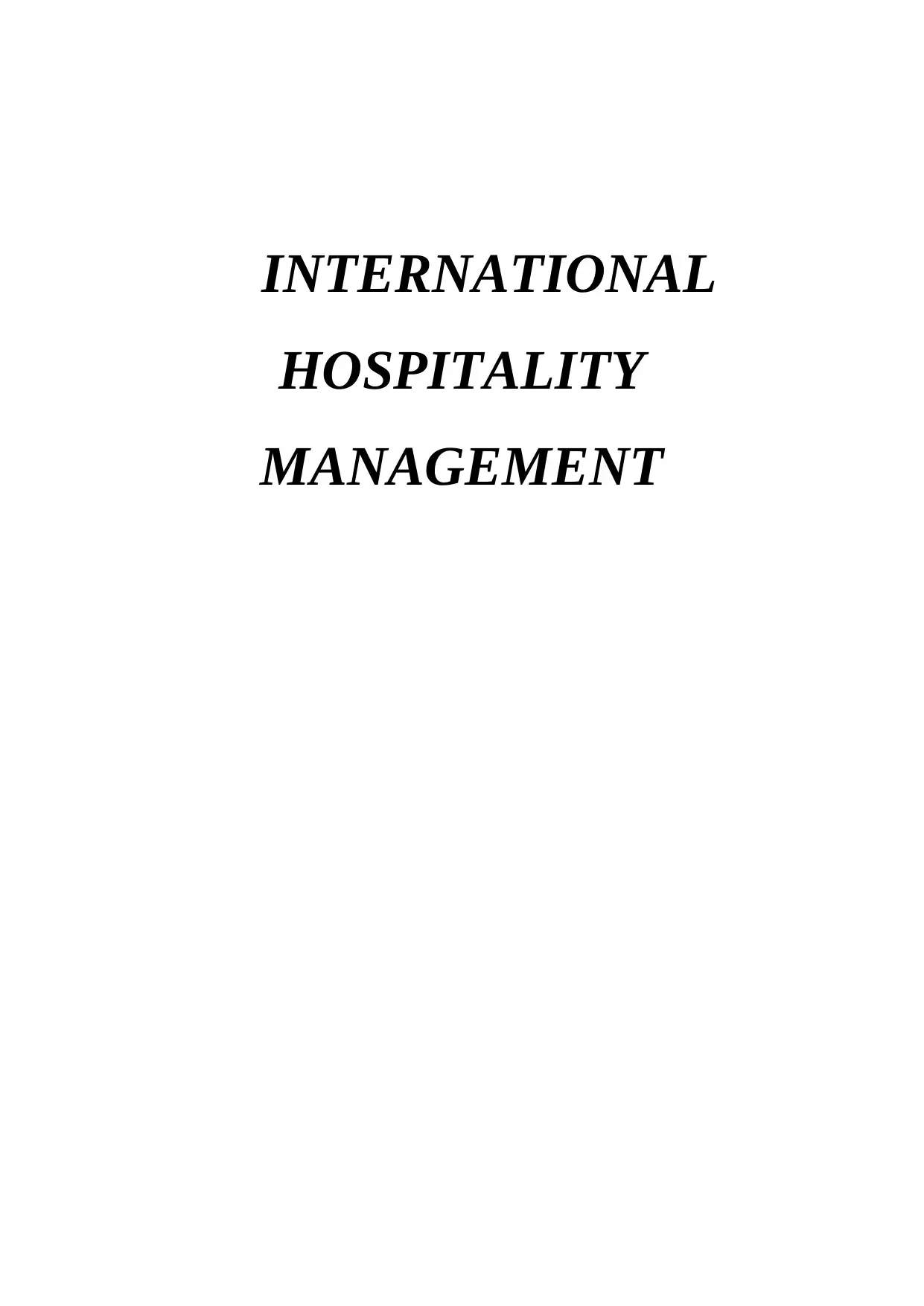
INTERNATIONAL
HOSPITALITY
MANAGEMENT
HOSPITALITY
MANAGEMENT
Secure Best Marks with AI Grader
Need help grading? Try our AI Grader for instant feedback on your assignments.
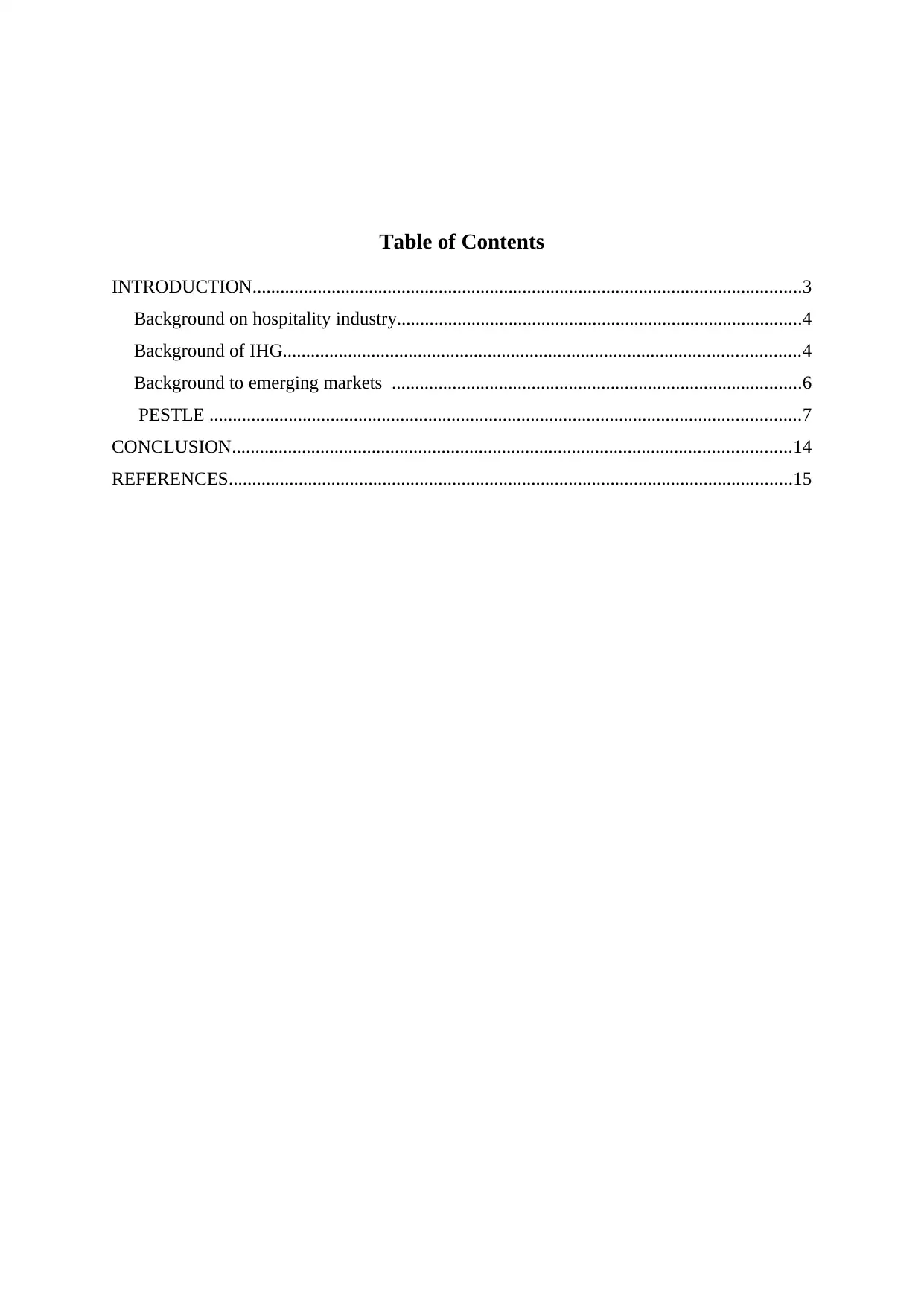
Table of Contents
INTRODUCTION......................................................................................................................3
Background on hospitality industry.......................................................................................4
Background of IHG...............................................................................................................4
Background to emerging markets ........................................................................................6
PESTLE ...............................................................................................................................7
CONCLUSION........................................................................................................................14
REFERENCES.........................................................................................................................15
INTRODUCTION......................................................................................................................3
Background on hospitality industry.......................................................................................4
Background of IHG...............................................................................................................4
Background to emerging markets ........................................................................................6
PESTLE ...............................................................................................................................7
CONCLUSION........................................................................................................................14
REFERENCES.........................................................................................................................15
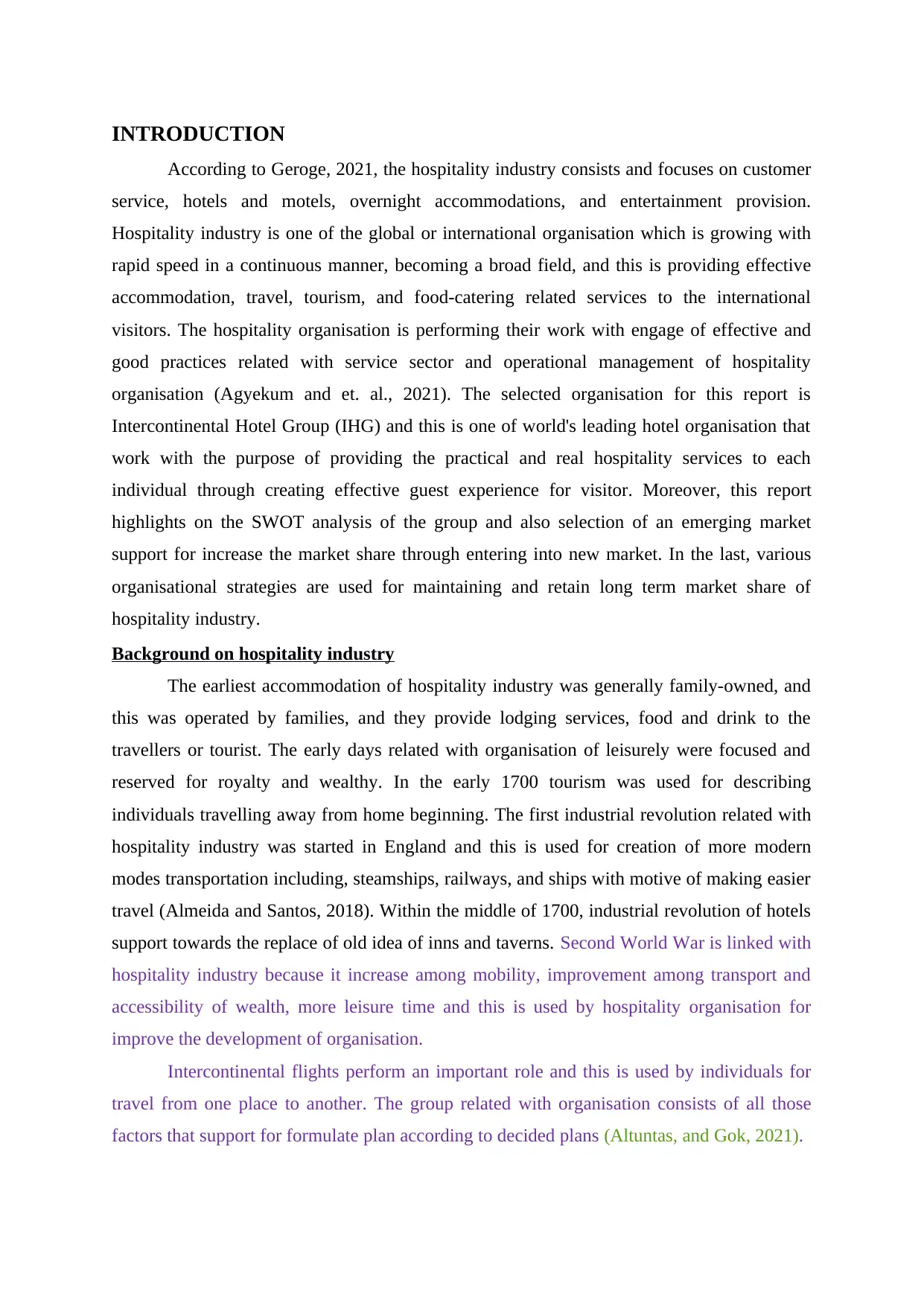
INTRODUCTION
According to Geroge, 2021, the hospitality industry consists and focuses on customer
service, hotels and motels, overnight accommodations, and entertainment provision.
Hospitality industry is one of the global or international organisation which is growing with
rapid speed in a continuous manner, becoming a broad field, and this is providing effective
accommodation, travel, tourism, and food-catering related services to the international
visitors. The hospitality organisation is performing their work with engage of effective and
good practices related with service sector and operational management of hospitality
organisation (Agyekum and et. al., 2021). The selected organisation for this report is
Intercontinental Hotel Group (IHG) and this is one of world's leading hotel organisation that
work with the purpose of providing the practical and real hospitality services to each
individual through creating effective guest experience for visitor. Moreover, this report
highlights on the SWOT analysis of the group and also selection of an emerging market
support for increase the market share through entering into new market. In the last, various
organisational strategies are used for maintaining and retain long term market share of
hospitality industry.
Background on hospitality industry
The earliest accommodation of hospitality industry was generally family-owned, and
this was operated by families, and they provide lodging services, food and drink to the
travellers or tourist. The early days related with organisation of leisurely were focused and
reserved for royalty and wealthy. In the early 1700 tourism was used for describing
individuals travelling away from home beginning. The first industrial revolution related with
hospitality industry was started in England and this is used for creation of more modern
modes transportation including, steamships, railways, and ships with motive of making easier
travel (Almeida and Santos, 2018). Within the middle of 1700, industrial revolution of hotels
support towards the replace of old idea of inns and taverns. Second World War is linked with
hospitality industry because it increase among mobility, improvement among transport and
accessibility of wealth, more leisure time and this is used by hospitality organisation for
improve the development of organisation.
Intercontinental flights perform an important role and this is used by individuals for
travel from one place to another. The group related with organisation consists of all those
factors that support for formulate plan according to decided plans (Altuntas, and Gok, 2021).
According to Geroge, 2021, the hospitality industry consists and focuses on customer
service, hotels and motels, overnight accommodations, and entertainment provision.
Hospitality industry is one of the global or international organisation which is growing with
rapid speed in a continuous manner, becoming a broad field, and this is providing effective
accommodation, travel, tourism, and food-catering related services to the international
visitors. The hospitality organisation is performing their work with engage of effective and
good practices related with service sector and operational management of hospitality
organisation (Agyekum and et. al., 2021). The selected organisation for this report is
Intercontinental Hotel Group (IHG) and this is one of world's leading hotel organisation that
work with the purpose of providing the practical and real hospitality services to each
individual through creating effective guest experience for visitor. Moreover, this report
highlights on the SWOT analysis of the group and also selection of an emerging market
support for increase the market share through entering into new market. In the last, various
organisational strategies are used for maintaining and retain long term market share of
hospitality industry.
Background on hospitality industry
The earliest accommodation of hospitality industry was generally family-owned, and
this was operated by families, and they provide lodging services, food and drink to the
travellers or tourist. The early days related with organisation of leisurely were focused and
reserved for royalty and wealthy. In the early 1700 tourism was used for describing
individuals travelling away from home beginning. The first industrial revolution related with
hospitality industry was started in England and this is used for creation of more modern
modes transportation including, steamships, railways, and ships with motive of making easier
travel (Almeida and Santos, 2018). Within the middle of 1700, industrial revolution of hotels
support towards the replace of old idea of inns and taverns. Second World War is linked with
hospitality industry because it increase among mobility, improvement among transport and
accessibility of wealth, more leisure time and this is used by hospitality organisation for
improve the development of organisation.
Intercontinental flights perform an important role and this is used by individuals for
travel from one place to another. The group related with organisation consists of all those
factors that support for formulate plan according to decided plans (Altuntas, and Gok, 2021).
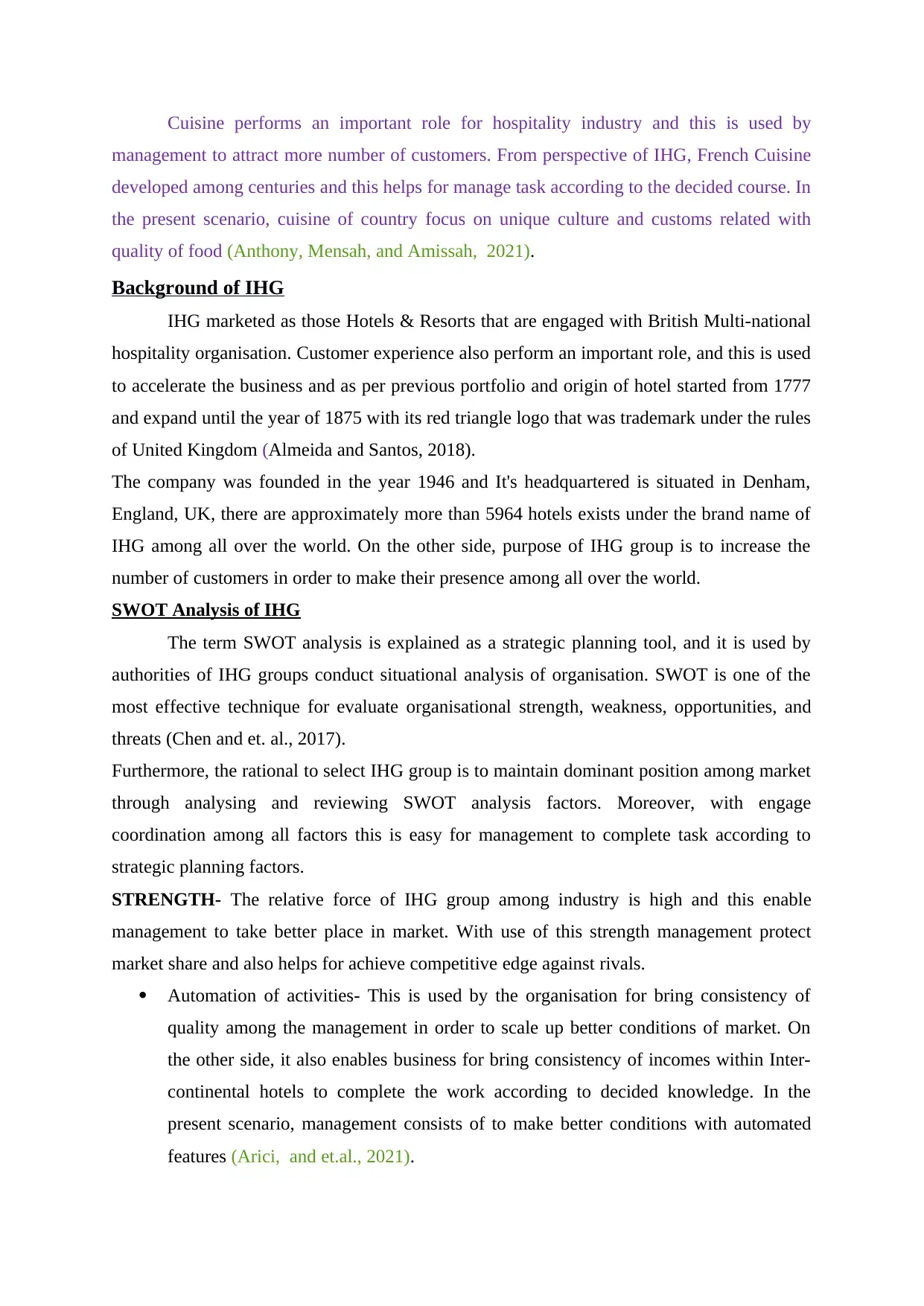
Cuisine performs an important role for hospitality industry and this is used by
management to attract more number of customers. From perspective of IHG, French Cuisine
developed among centuries and this helps for manage task according to the decided course. In
the present scenario, cuisine of country focus on unique culture and customs related with
quality of food (Anthony, Mensah, and Amissah, 2021).
Background of IHG
IHG marketed as those Hotels & Resorts that are engaged with British Multi-national
hospitality organisation. Customer experience also perform an important role, and this is used
to accelerate the business and as per previous portfolio and origin of hotel started from 1777
and expand until the year of 1875 with its red triangle logo that was trademark under the rules
of United Kingdom (Almeida and Santos, 2018).
The company was founded in the year 1946 and It's headquartered is situated in Denham,
England, UK, there are approximately more than 5964 hotels exists under the brand name of
IHG among all over the world. On the other side, purpose of IHG group is to increase the
number of customers in order to make their presence among all over the world.
SWOT Analysis of IHG
The term SWOT analysis is explained as a strategic planning tool, and it is used by
authorities of IHG groups conduct situational analysis of organisation. SWOT is one of the
most effective technique for evaluate organisational strength, weakness, opportunities, and
threats (Chen and et. al., 2017).
Furthermore, the rational to select IHG group is to maintain dominant position among market
through analysing and reviewing SWOT analysis factors. Moreover, with engage
coordination among all factors this is easy for management to complete task according to
strategic planning factors.
STRENGTH- The relative force of IHG group among industry is high and this enable
management to take better place in market. With use of this strength management protect
market share and also helps for achieve competitive edge against rivals.
Automation of activities- This is used by the organisation for bring consistency of
quality among the management in order to scale up better conditions of market. On
the other side, it also enables business for bring consistency of incomes within Inter-
continental hotels to complete the work according to decided knowledge. In the
present scenario, management consists of to make better conditions with automated
features (Arici, and et.al., 2021).
management to attract more number of customers. From perspective of IHG, French Cuisine
developed among centuries and this helps for manage task according to the decided course. In
the present scenario, cuisine of country focus on unique culture and customs related with
quality of food (Anthony, Mensah, and Amissah, 2021).
Background of IHG
IHG marketed as those Hotels & Resorts that are engaged with British Multi-national
hospitality organisation. Customer experience also perform an important role, and this is used
to accelerate the business and as per previous portfolio and origin of hotel started from 1777
and expand until the year of 1875 with its red triangle logo that was trademark under the rules
of United Kingdom (Almeida and Santos, 2018).
The company was founded in the year 1946 and It's headquartered is situated in Denham,
England, UK, there are approximately more than 5964 hotels exists under the brand name of
IHG among all over the world. On the other side, purpose of IHG group is to increase the
number of customers in order to make their presence among all over the world.
SWOT Analysis of IHG
The term SWOT analysis is explained as a strategic planning tool, and it is used by
authorities of IHG groups conduct situational analysis of organisation. SWOT is one of the
most effective technique for evaluate organisational strength, weakness, opportunities, and
threats (Chen and et. al., 2017).
Furthermore, the rational to select IHG group is to maintain dominant position among market
through analysing and reviewing SWOT analysis factors. Moreover, with engage
coordination among all factors this is easy for management to complete task according to
strategic planning factors.
STRENGTH- The relative force of IHG group among industry is high and this enable
management to take better place in market. With use of this strength management protect
market share and also helps for achieve competitive edge against rivals.
Automation of activities- This is used by the organisation for bring consistency of
quality among the management in order to scale up better conditions of market. On
the other side, it also enables business for bring consistency of incomes within Inter-
continental hotels to complete the work according to decided knowledge. In the
present scenario, management consists of to make better conditions with automated
features (Arici, and et.al., 2021).
Secure Best Marks with AI Grader
Need help grading? Try our AI Grader for instant feedback on your assignments.
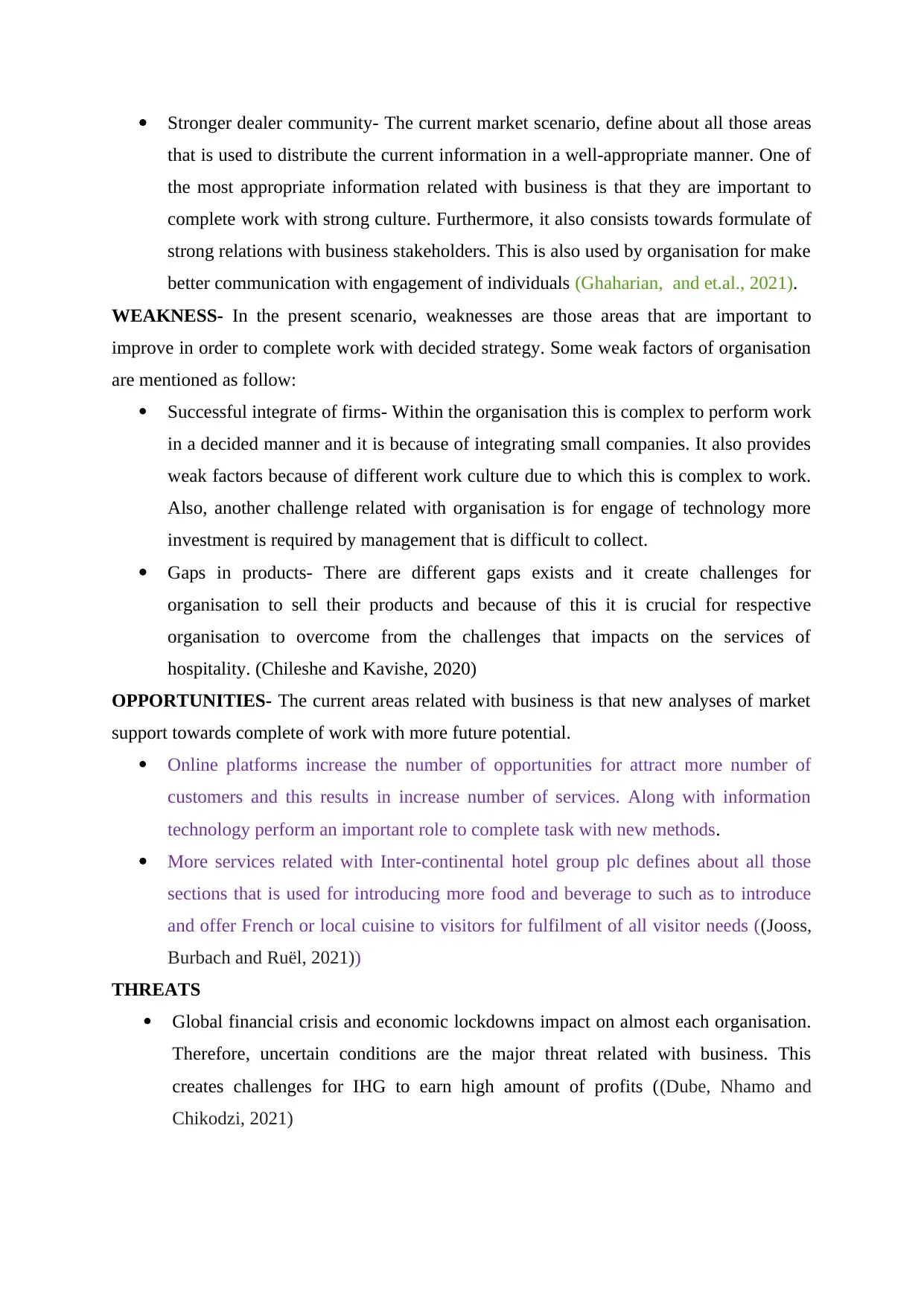
Stronger dealer community- The current market scenario, define about all those areas
that is used to distribute the current information in a well-appropriate manner. One of
the most appropriate information related with business is that they are important to
complete work with strong culture. Furthermore, it also consists towards formulate of
strong relations with business stakeholders. This is also used by organisation for make
better communication with engagement of individuals (Ghaharian, and et.al., 2021).
WEAKNESS- In the present scenario, weaknesses are those areas that are important to
improve in order to complete work with decided strategy. Some weak factors of organisation
are mentioned as follow:
Successful integrate of firms- Within the organisation this is complex to perform work
in a decided manner and it is because of integrating small companies. It also provides
weak factors because of different work culture due to which this is complex to work.
Also, another challenge related with organisation is for engage of technology more
investment is required by management that is difficult to collect.
Gaps in products- There are different gaps exists and it create challenges for
organisation to sell their products and because of this it is crucial for respective
organisation to overcome from the challenges that impacts on the services of
hospitality. (Chileshe and Kavishe, 2020)
OPPORTUNITIES- The current areas related with business is that new analyses of market
support towards complete of work with more future potential.
Online platforms increase the number of opportunities for attract more number of
customers and this results in increase number of services. Along with information
technology perform an important role to complete task with new methods.
More services related with Inter-continental hotel group plc defines about all those
sections that is used for introducing more food and beverage to such as to introduce
and offer French or local cuisine to visitors for fulfilment of all visitor needs ((Jooss,
Burbach and Ruël, 2021))
THREATS
Global financial crisis and economic lockdowns impact on almost each organisation.
Therefore, uncertain conditions are the major threat related with business. This
creates challenges for IHG to earn high amount of profits ((Dube, Nhamo and
Chikodzi, 2021)
that is used to distribute the current information in a well-appropriate manner. One of
the most appropriate information related with business is that they are important to
complete work with strong culture. Furthermore, it also consists towards formulate of
strong relations with business stakeholders. This is also used by organisation for make
better communication with engagement of individuals (Ghaharian, and et.al., 2021).
WEAKNESS- In the present scenario, weaknesses are those areas that are important to
improve in order to complete work with decided strategy. Some weak factors of organisation
are mentioned as follow:
Successful integrate of firms- Within the organisation this is complex to perform work
in a decided manner and it is because of integrating small companies. It also provides
weak factors because of different work culture due to which this is complex to work.
Also, another challenge related with organisation is for engage of technology more
investment is required by management that is difficult to collect.
Gaps in products- There are different gaps exists and it create challenges for
organisation to sell their products and because of this it is crucial for respective
organisation to overcome from the challenges that impacts on the services of
hospitality. (Chileshe and Kavishe, 2020)
OPPORTUNITIES- The current areas related with business is that new analyses of market
support towards complete of work with more future potential.
Online platforms increase the number of opportunities for attract more number of
customers and this results in increase number of services. Along with information
technology perform an important role to complete task with new methods.
More services related with Inter-continental hotel group plc defines about all those
sections that is used for introducing more food and beverage to such as to introduce
and offer French or local cuisine to visitors for fulfilment of all visitor needs ((Jooss,
Burbach and Ruël, 2021))
THREATS
Global financial crisis and economic lockdowns impact on almost each organisation.
Therefore, uncertain conditions are the major threat related with business. This
creates challenges for IHG to earn high amount of profits ((Dube, Nhamo and
Chikodzi, 2021)
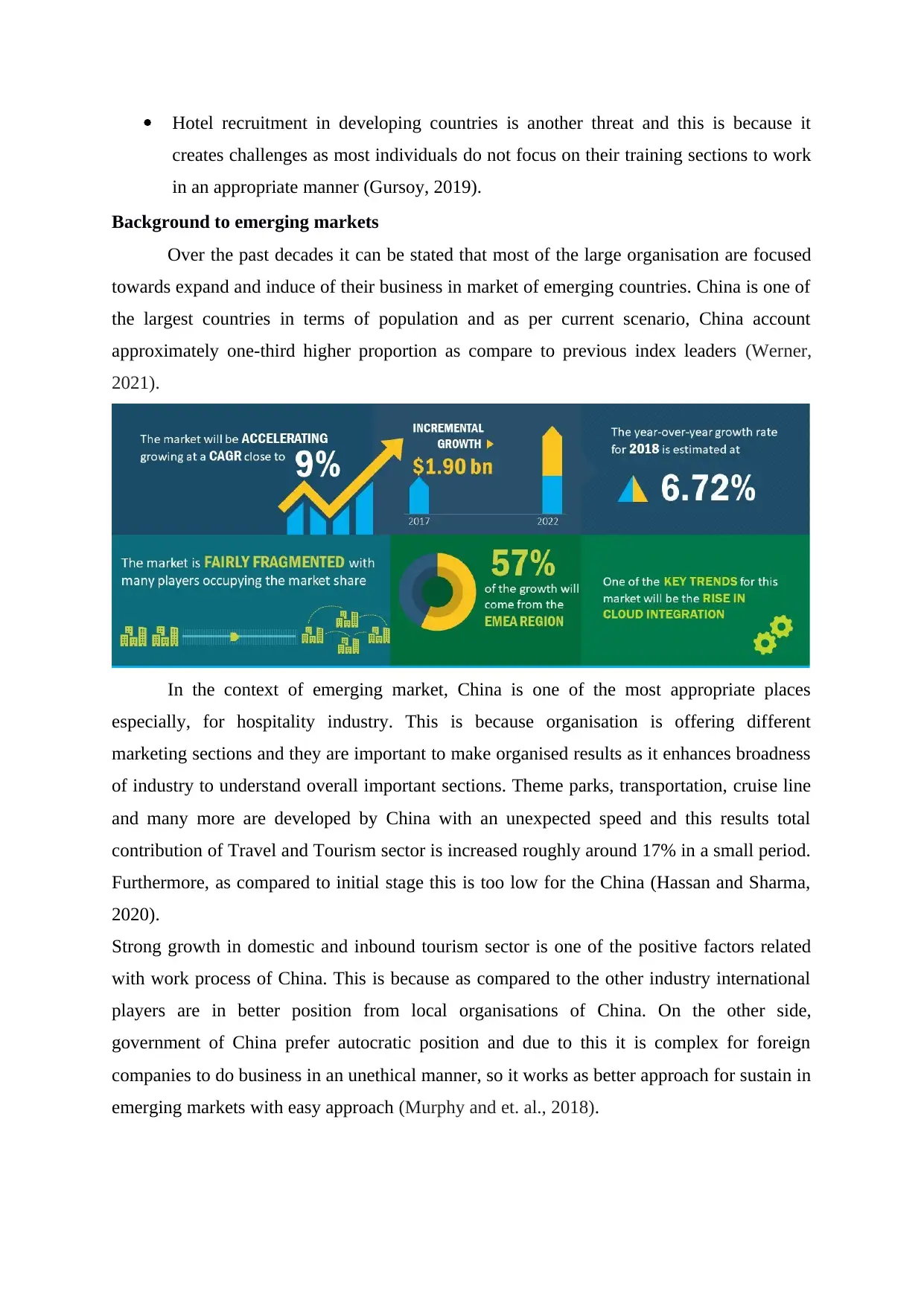
Hotel recruitment in developing countries is another threat and this is because it
creates challenges as most individuals do not focus on their training sections to work
in an appropriate manner (Gursoy, 2019).
Background to emerging markets
Over the past decades it can be stated that most of the large organisation are focused
towards expand and induce of their business in market of emerging countries. China is one of
the largest countries in terms of population and as per current scenario, China account
approximately one-third higher proportion as compare to previous index leaders (Werner,
2021).
In the context of emerging market, China is one of the most appropriate places
especially, for hospitality industry. This is because organisation is offering different
marketing sections and they are important to make organised results as it enhances broadness
of industry to understand overall important sections. Theme parks, transportation, cruise line
and many more are developed by China with an unexpected speed and this results total
contribution of Travel and Tourism sector is increased roughly around 17% in a small period.
Furthermore, as compared to initial stage this is too low for the China (Hassan and Sharma,
2020).
Strong growth in domestic and inbound tourism sector is one of the positive factors related
with work process of China. This is because as compared to the other industry international
players are in better position from local organisations of China. On the other side,
government of China prefer autocratic position and due to this it is complex for foreign
companies to do business in an unethical manner, so it works as better approach for sustain in
emerging markets with easy approach (Murphy and et. al., 2018).
creates challenges as most individuals do not focus on their training sections to work
in an appropriate manner (Gursoy, 2019).
Background to emerging markets
Over the past decades it can be stated that most of the large organisation are focused
towards expand and induce of their business in market of emerging countries. China is one of
the largest countries in terms of population and as per current scenario, China account
approximately one-third higher proportion as compare to previous index leaders (Werner,
2021).
In the context of emerging market, China is one of the most appropriate places
especially, for hospitality industry. This is because organisation is offering different
marketing sections and they are important to make organised results as it enhances broadness
of industry to understand overall important sections. Theme parks, transportation, cruise line
and many more are developed by China with an unexpected speed and this results total
contribution of Travel and Tourism sector is increased roughly around 17% in a small period.
Furthermore, as compared to initial stage this is too low for the China (Hassan and Sharma,
2020).
Strong growth in domestic and inbound tourism sector is one of the positive factors related
with work process of China. This is because as compared to the other industry international
players are in better position from local organisations of China. On the other side,
government of China prefer autocratic position and due to this it is complex for foreign
companies to do business in an unethical manner, so it works as better approach for sustain in
emerging markets with easy approach (Murphy and et. al., 2018).
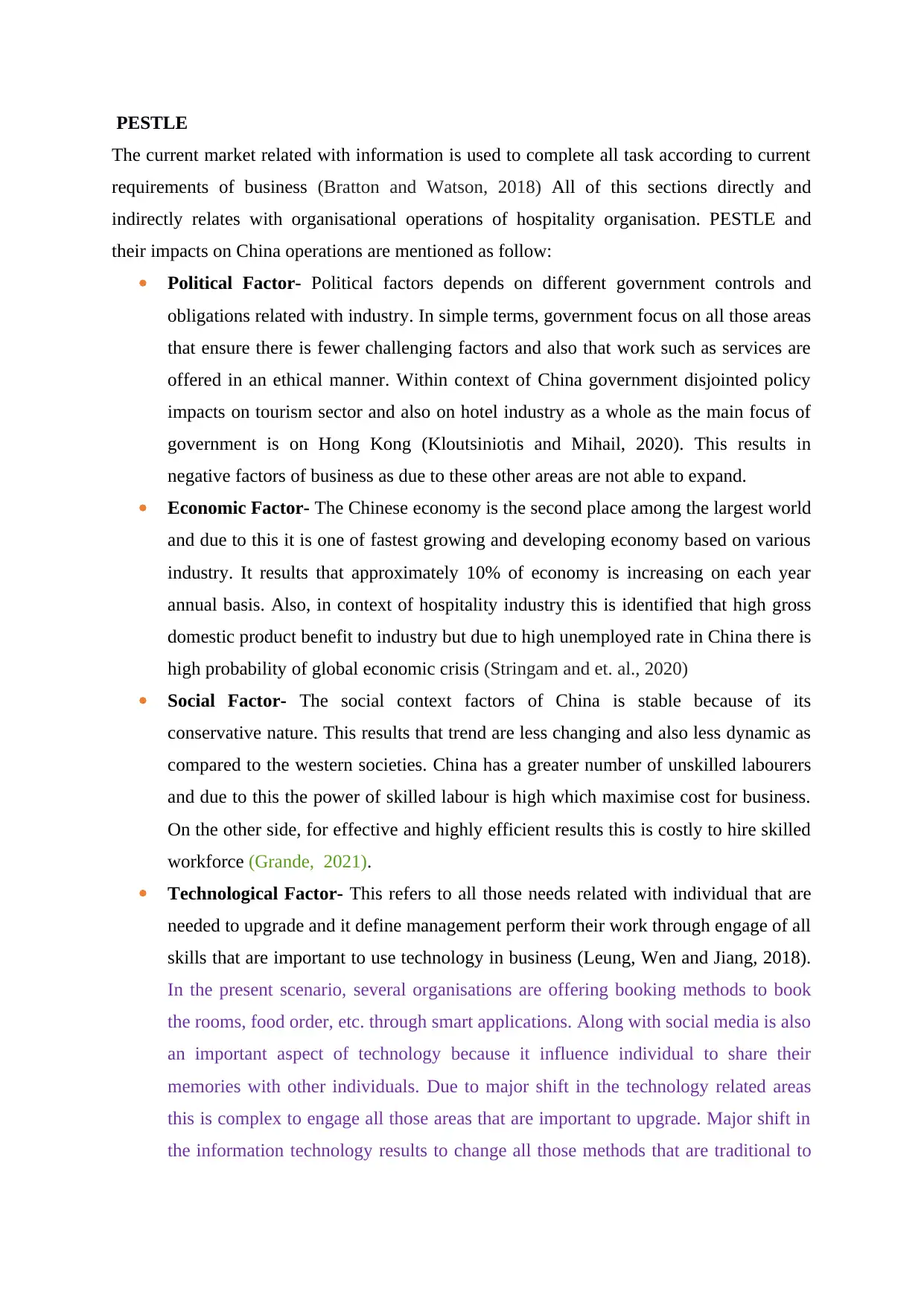
PESTLE
The current market related with information is used to complete all task according to current
requirements of business (Bratton and Watson, 2018) All of this sections directly and
indirectly relates with organisational operations of hospitality organisation. PESTLE and
their impacts on China operations are mentioned as follow:
Political Factor- Political factors depends on different government controls and
obligations related with industry. In simple terms, government focus on all those areas
that ensure there is fewer challenging factors and also that work such as services are
offered in an ethical manner. Within context of China government disjointed policy
impacts on tourism sector and also on hotel industry as a whole as the main focus of
government is on Hong Kong (Kloutsiniotis and Mihail, 2020). This results in
negative factors of business as due to these other areas are not able to expand.
Economic Factor- The Chinese economy is the second place among the largest world
and due to this it is one of fastest growing and developing economy based on various
industry. It results that approximately 10% of economy is increasing on each year
annual basis. Also, in context of hospitality industry this is identified that high gross
domestic product benefit to industry but due to high unemployed rate in China there is
high probability of global economic crisis (Stringam and et. al., 2020)
Social Factor- The social context factors of China is stable because of its
conservative nature. This results that trend are less changing and also less dynamic as
compared to the western societies. China has a greater number of unskilled labourers
and due to this the power of skilled labour is high which maximise cost for business.
On the other side, for effective and highly efficient results this is costly to hire skilled
workforce (Grande, 2021).
Technological Factor- This refers to all those needs related with individual that are
needed to upgrade and it define management perform their work through engage of all
skills that are important to use technology in business (Leung, Wen and Jiang, 2018).
In the present scenario, several organisations are offering booking methods to book
the rooms, food order, etc. through smart applications. Along with social media is also
an important aspect of technology because it influence individual to share their
memories with other individuals. Due to major shift in the technology related areas
this is complex to engage all those areas that are important to upgrade. Major shift in
the information technology results to change all those methods that are traditional to
The current market related with information is used to complete all task according to current
requirements of business (Bratton and Watson, 2018) All of this sections directly and
indirectly relates with organisational operations of hospitality organisation. PESTLE and
their impacts on China operations are mentioned as follow:
Political Factor- Political factors depends on different government controls and
obligations related with industry. In simple terms, government focus on all those areas
that ensure there is fewer challenging factors and also that work such as services are
offered in an ethical manner. Within context of China government disjointed policy
impacts on tourism sector and also on hotel industry as a whole as the main focus of
government is on Hong Kong (Kloutsiniotis and Mihail, 2020). This results in
negative factors of business as due to these other areas are not able to expand.
Economic Factor- The Chinese economy is the second place among the largest world
and due to this it is one of fastest growing and developing economy based on various
industry. It results that approximately 10% of economy is increasing on each year
annual basis. Also, in context of hospitality industry this is identified that high gross
domestic product benefit to industry but due to high unemployed rate in China there is
high probability of global economic crisis (Stringam and et. al., 2020)
Social Factor- The social context factors of China is stable because of its
conservative nature. This results that trend are less changing and also less dynamic as
compared to the western societies. China has a greater number of unskilled labourers
and due to this the power of skilled labour is high which maximise cost for business.
On the other side, for effective and highly efficient results this is costly to hire skilled
workforce (Grande, 2021).
Technological Factor- This refers to all those needs related with individual that are
needed to upgrade and it define management perform their work through engage of all
skills that are important to use technology in business (Leung, Wen and Jiang, 2018).
In the present scenario, several organisations are offering booking methods to book
the rooms, food order, etc. through smart applications. Along with social media is also
an important aspect of technology because it influence individual to share their
memories with other individuals. Due to major shift in the technology related areas
this is complex to engage all those areas that are important to upgrade. Major shift in
the information technology results to change all those methods that are traditional to
Paraphrase This Document
Need a fresh take? Get an instant paraphrase of this document with our AI Paraphraser
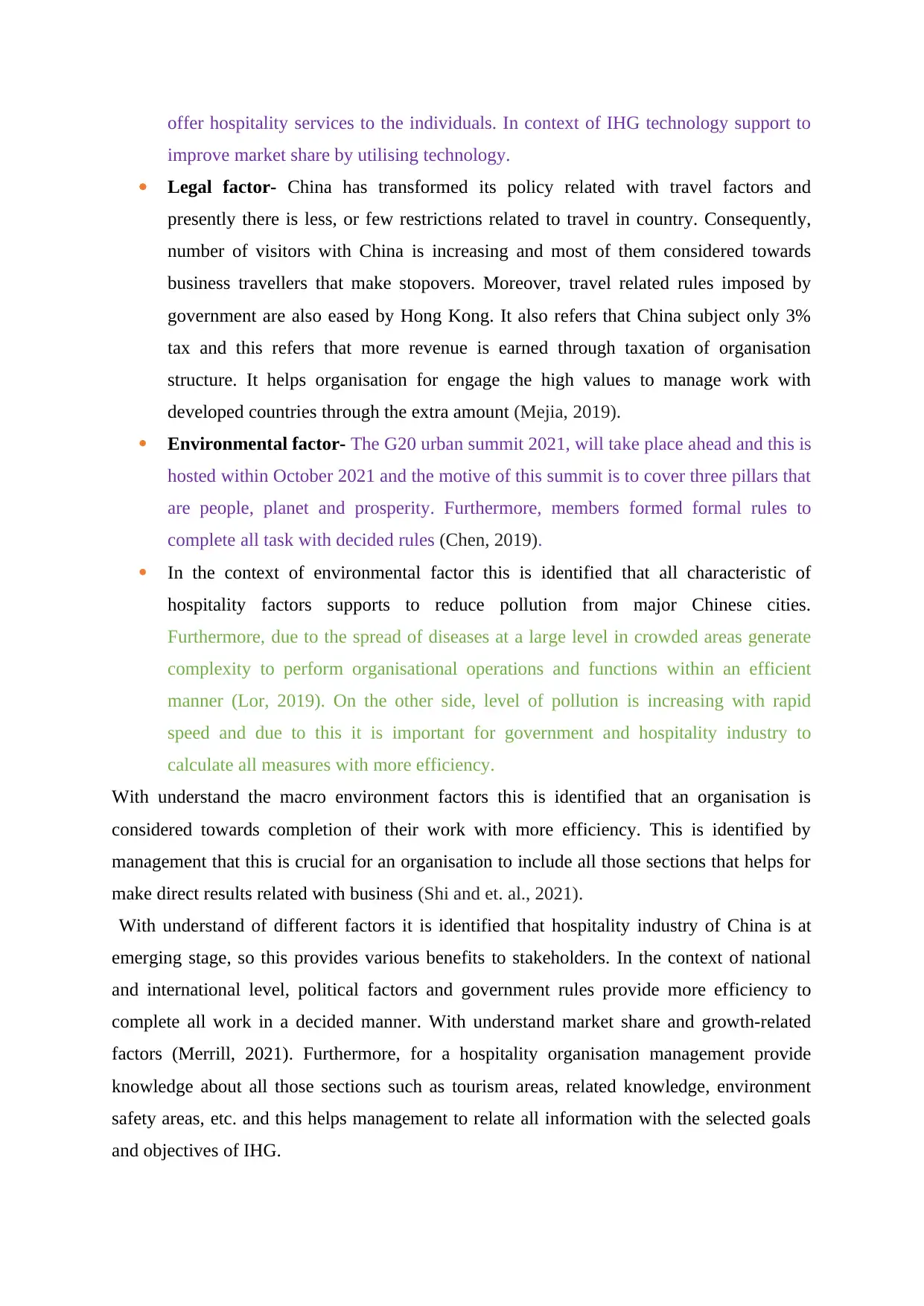
offer hospitality services to the individuals. In context of IHG technology support to
improve market share by utilising technology.
Legal factor- China has transformed its policy related with travel factors and
presently there is less, or few restrictions related to travel in country. Consequently,
number of visitors with China is increasing and most of them considered towards
business travellers that make stopovers. Moreover, travel related rules imposed by
government are also eased by Hong Kong. It also refers that China subject only 3%
tax and this refers that more revenue is earned through taxation of organisation
structure. It helps organisation for engage the high values to manage work with
developed countries through the extra amount (Mejia, 2019).
Environmental factor- The G20 urban summit 2021, will take place ahead and this is
hosted within October 2021 and the motive of this summit is to cover three pillars that
are people, planet and prosperity. Furthermore, members formed formal rules to
complete all task with decided rules (Chen, 2019).
In the context of environmental factor this is identified that all characteristic of
hospitality factors supports to reduce pollution from major Chinese cities.
Furthermore, due to the spread of diseases at a large level in crowded areas generate
complexity to perform organisational operations and functions within an efficient
manner (Lor, 2019). On the other side, level of pollution is increasing with rapid
speed and due to this it is important for government and hospitality industry to
calculate all measures with more efficiency.
With understand the macro environment factors this is identified that an organisation is
considered towards completion of their work with more efficiency. This is identified by
management that this is crucial for an organisation to include all those sections that helps for
make direct results related with business (Shi and et. al., 2021).
With understand of different factors it is identified that hospitality industry of China is at
emerging stage, so this provides various benefits to stakeholders. In the context of national
and international level, political factors and government rules provide more efficiency to
complete all work in a decided manner. With understand market share and growth-related
factors (Merrill, 2021). Furthermore, for a hospitality organisation management provide
knowledge about all those sections such as tourism areas, related knowledge, environment
safety areas, etc. and this helps management to relate all information with the selected goals
and objectives of IHG.
improve market share by utilising technology.
Legal factor- China has transformed its policy related with travel factors and
presently there is less, or few restrictions related to travel in country. Consequently,
number of visitors with China is increasing and most of them considered towards
business travellers that make stopovers. Moreover, travel related rules imposed by
government are also eased by Hong Kong. It also refers that China subject only 3%
tax and this refers that more revenue is earned through taxation of organisation
structure. It helps organisation for engage the high values to manage work with
developed countries through the extra amount (Mejia, 2019).
Environmental factor- The G20 urban summit 2021, will take place ahead and this is
hosted within October 2021 and the motive of this summit is to cover three pillars that
are people, planet and prosperity. Furthermore, members formed formal rules to
complete all task with decided rules (Chen, 2019).
In the context of environmental factor this is identified that all characteristic of
hospitality factors supports to reduce pollution from major Chinese cities.
Furthermore, due to the spread of diseases at a large level in crowded areas generate
complexity to perform organisational operations and functions within an efficient
manner (Lor, 2019). On the other side, level of pollution is increasing with rapid
speed and due to this it is important for government and hospitality industry to
calculate all measures with more efficiency.
With understand the macro environment factors this is identified that an organisation is
considered towards completion of their work with more efficiency. This is identified by
management that this is crucial for an organisation to include all those sections that helps for
make direct results related with business (Shi and et. al., 2021).
With understand of different factors it is identified that hospitality industry of China is at
emerging stage, so this provides various benefits to stakeholders. In the context of national
and international level, political factors and government rules provide more efficiency to
complete all work in a decided manner. With understand market share and growth-related
factors (Merrill, 2021). Furthermore, for a hospitality organisation management provide
knowledge about all those sections such as tourism areas, related knowledge, environment
safety areas, etc. and this helps management to relate all information with the selected goals
and objectives of IHG.
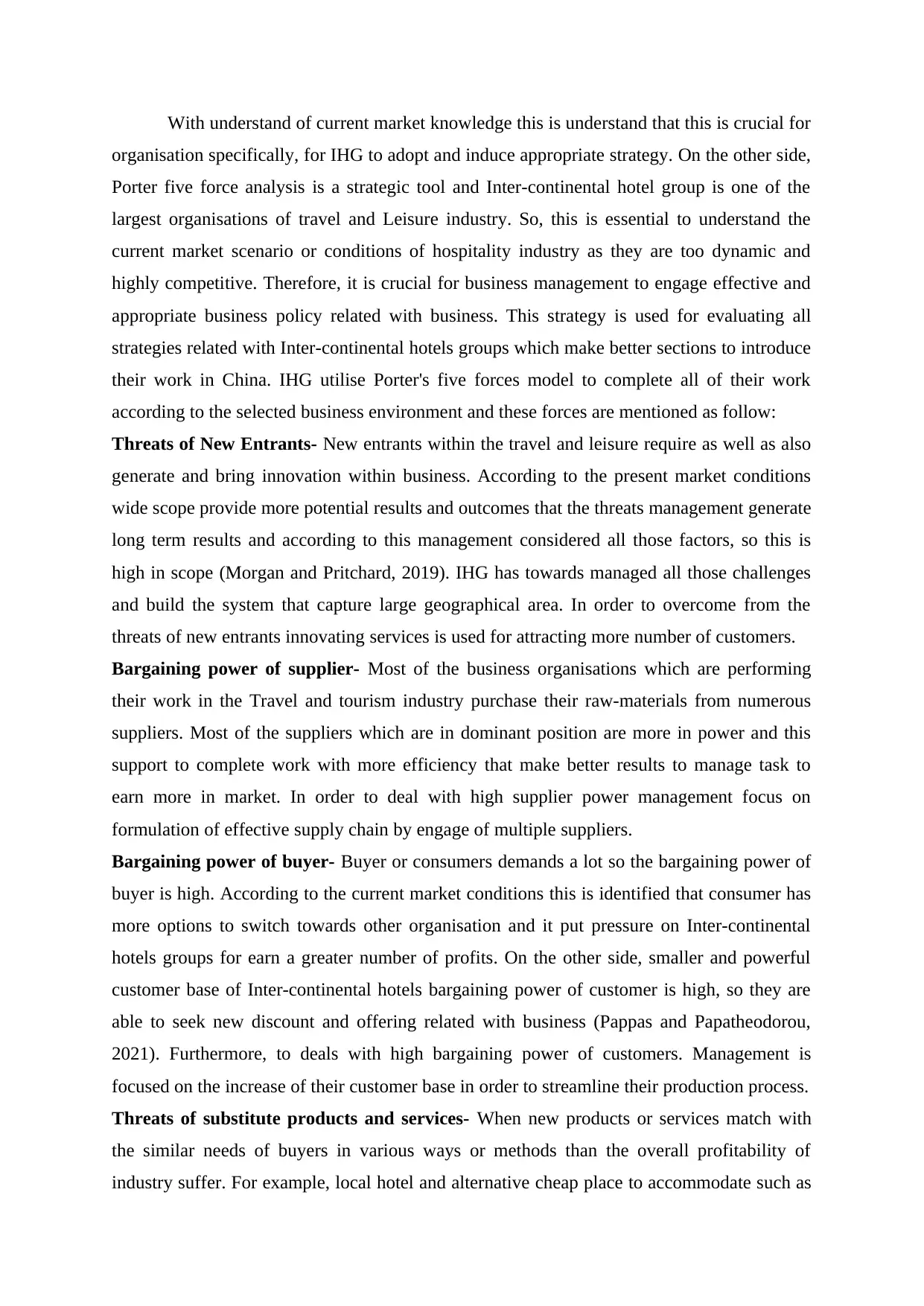
With understand of current market knowledge this is understand that this is crucial for
organisation specifically, for IHG to adopt and induce appropriate strategy. On the other side,
Porter five force analysis is a strategic tool and Inter-continental hotel group is one of the
largest organisations of travel and Leisure industry. So, this is essential to understand the
current market scenario or conditions of hospitality industry as they are too dynamic and
highly competitive. Therefore, it is crucial for business management to engage effective and
appropriate business policy related with business. This strategy is used for evaluating all
strategies related with Inter-continental hotels groups which make better sections to introduce
their work in China. IHG utilise Porter's five forces model to complete all of their work
according to the selected business environment and these forces are mentioned as follow:
Threats of New Entrants- New entrants within the travel and leisure require as well as also
generate and bring innovation within business. According to the present market conditions
wide scope provide more potential results and outcomes that the threats management generate
long term results and according to this management considered all those factors, so this is
high in scope (Morgan and Pritchard, 2019). IHG has towards managed all those challenges
and build the system that capture large geographical area. In order to overcome from the
threats of new entrants innovating services is used for attracting more number of customers.
Bargaining power of supplier- Most of the business organisations which are performing
their work in the Travel and tourism industry purchase their raw-materials from numerous
suppliers. Most of the suppliers which are in dominant position are more in power and this
support to complete work with more efficiency that make better results to manage task to
earn more in market. In order to deal with high supplier power management focus on
formulation of effective supply chain by engage of multiple suppliers.
Bargaining power of buyer- Buyer or consumers demands a lot so the bargaining power of
buyer is high. According to the current market conditions this is identified that consumer has
more options to switch towards other organisation and it put pressure on Inter-continental
hotels groups for earn a greater number of profits. On the other side, smaller and powerful
customer base of Inter-continental hotels bargaining power of customer is high, so they are
able to seek new discount and offering related with business (Pappas and Papatheodorou,
2021). Furthermore, to deals with high bargaining power of customers. Management is
focused on the increase of their customer base in order to streamline their production process.
Threats of substitute products and services- When new products or services match with
the similar needs of buyers in various ways or methods than the overall profitability of
industry suffer. For example, local hotel and alternative cheap place to accommodate such as
organisation specifically, for IHG to adopt and induce appropriate strategy. On the other side,
Porter five force analysis is a strategic tool and Inter-continental hotel group is one of the
largest organisations of travel and Leisure industry. So, this is essential to understand the
current market scenario or conditions of hospitality industry as they are too dynamic and
highly competitive. Therefore, it is crucial for business management to engage effective and
appropriate business policy related with business. This strategy is used for evaluating all
strategies related with Inter-continental hotels groups which make better sections to introduce
their work in China. IHG utilise Porter's five forces model to complete all of their work
according to the selected business environment and these forces are mentioned as follow:
Threats of New Entrants- New entrants within the travel and leisure require as well as also
generate and bring innovation within business. According to the present market conditions
wide scope provide more potential results and outcomes that the threats management generate
long term results and according to this management considered all those factors, so this is
high in scope (Morgan and Pritchard, 2019). IHG has towards managed all those challenges
and build the system that capture large geographical area. In order to overcome from the
threats of new entrants innovating services is used for attracting more number of customers.
Bargaining power of supplier- Most of the business organisations which are performing
their work in the Travel and tourism industry purchase their raw-materials from numerous
suppliers. Most of the suppliers which are in dominant position are more in power and this
support to complete work with more efficiency that make better results to manage task to
earn more in market. In order to deal with high supplier power management focus on
formulation of effective supply chain by engage of multiple suppliers.
Bargaining power of buyer- Buyer or consumers demands a lot so the bargaining power of
buyer is high. According to the current market conditions this is identified that consumer has
more options to switch towards other organisation and it put pressure on Inter-continental
hotels groups for earn a greater number of profits. On the other side, smaller and powerful
customer base of Inter-continental hotels bargaining power of customer is high, so they are
able to seek new discount and offering related with business (Pappas and Papatheodorou,
2021). Furthermore, to deals with high bargaining power of customers. Management is
focused on the increase of their customer base in order to streamline their production process.
Threats of substitute products and services- When new products or services match with
the similar needs of buyers in various ways or methods than the overall profitability of
industry suffer. For example, local hotel and alternative cheap place to accommodate such as
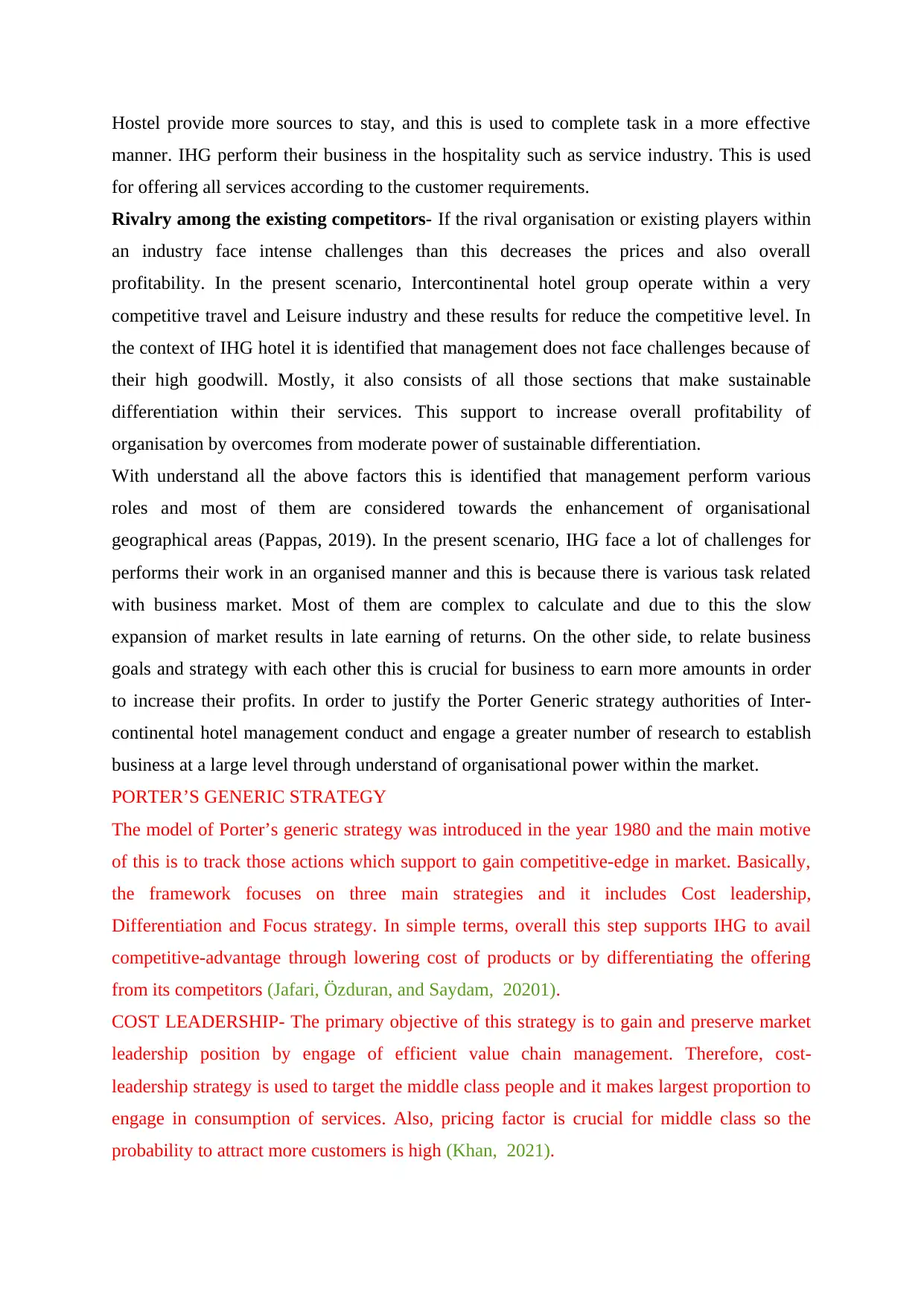
Hostel provide more sources to stay, and this is used to complete task in a more effective
manner. IHG perform their business in the hospitality such as service industry. This is used
for offering all services according to the customer requirements.
Rivalry among the existing competitors- If the rival organisation or existing players within
an industry face intense challenges than this decreases the prices and also overall
profitability. In the present scenario, Intercontinental hotel group operate within a very
competitive travel and Leisure industry and these results for reduce the competitive level. In
the context of IHG hotel it is identified that management does not face challenges because of
their high goodwill. Mostly, it also consists of all those sections that make sustainable
differentiation within their services. This support to increase overall profitability of
organisation by overcomes from moderate power of sustainable differentiation.
With understand all the above factors this is identified that management perform various
roles and most of them are considered towards the enhancement of organisational
geographical areas (Pappas, 2019). In the present scenario, IHG face a lot of challenges for
performs their work in an organised manner and this is because there is various task related
with business market. Most of them are complex to calculate and due to this the slow
expansion of market results in late earning of returns. On the other side, to relate business
goals and strategy with each other this is crucial for business to earn more amounts in order
to increase their profits. In order to justify the Porter Generic strategy authorities of Inter-
continental hotel management conduct and engage a greater number of research to establish
business at a large level through understand of organisational power within the market.
PORTER’S GENERIC STRATEGY
The model of Porter’s generic strategy was introduced in the year 1980 and the main motive
of this is to track those actions which support to gain competitive-edge in market. Basically,
the framework focuses on three main strategies and it includes Cost leadership,
Differentiation and Focus strategy. In simple terms, overall this step supports IHG to avail
competitive-advantage through lowering cost of products or by differentiating the offering
from its competitors (Jafari, Özduran, and Saydam, 20201).
COST LEADERSHIP- The primary objective of this strategy is to gain and preserve market
leadership position by engage of efficient value chain management. Therefore, cost-
leadership strategy is used to target the middle class people and it makes largest proportion to
engage in consumption of services. Also, pricing factor is crucial for middle class so the
probability to attract more customers is high (Khan, 2021).
manner. IHG perform their business in the hospitality such as service industry. This is used
for offering all services according to the customer requirements.
Rivalry among the existing competitors- If the rival organisation or existing players within
an industry face intense challenges than this decreases the prices and also overall
profitability. In the present scenario, Intercontinental hotel group operate within a very
competitive travel and Leisure industry and these results for reduce the competitive level. In
the context of IHG hotel it is identified that management does not face challenges because of
their high goodwill. Mostly, it also consists of all those sections that make sustainable
differentiation within their services. This support to increase overall profitability of
organisation by overcomes from moderate power of sustainable differentiation.
With understand all the above factors this is identified that management perform various
roles and most of them are considered towards the enhancement of organisational
geographical areas (Pappas, 2019). In the present scenario, IHG face a lot of challenges for
performs their work in an organised manner and this is because there is various task related
with business market. Most of them are complex to calculate and due to this the slow
expansion of market results in late earning of returns. On the other side, to relate business
goals and strategy with each other this is crucial for business to earn more amounts in order
to increase their profits. In order to justify the Porter Generic strategy authorities of Inter-
continental hotel management conduct and engage a greater number of research to establish
business at a large level through understand of organisational power within the market.
PORTER’S GENERIC STRATEGY
The model of Porter’s generic strategy was introduced in the year 1980 and the main motive
of this is to track those actions which support to gain competitive-edge in market. Basically,
the framework focuses on three main strategies and it includes Cost leadership,
Differentiation and Focus strategy. In simple terms, overall this step supports IHG to avail
competitive-advantage through lowering cost of products or by differentiating the offering
from its competitors (Jafari, Özduran, and Saydam, 20201).
COST LEADERSHIP- The primary objective of this strategy is to gain and preserve market
leadership position by engage of efficient value chain management. Therefore, cost-
leadership strategy is used to target the middle class people and it makes largest proportion to
engage in consumption of services. Also, pricing factor is crucial for middle class so the
probability to attract more customers is high (Khan, 2021).
Secure Best Marks with AI Grader
Need help grading? Try our AI Grader for instant feedback on your assignments.
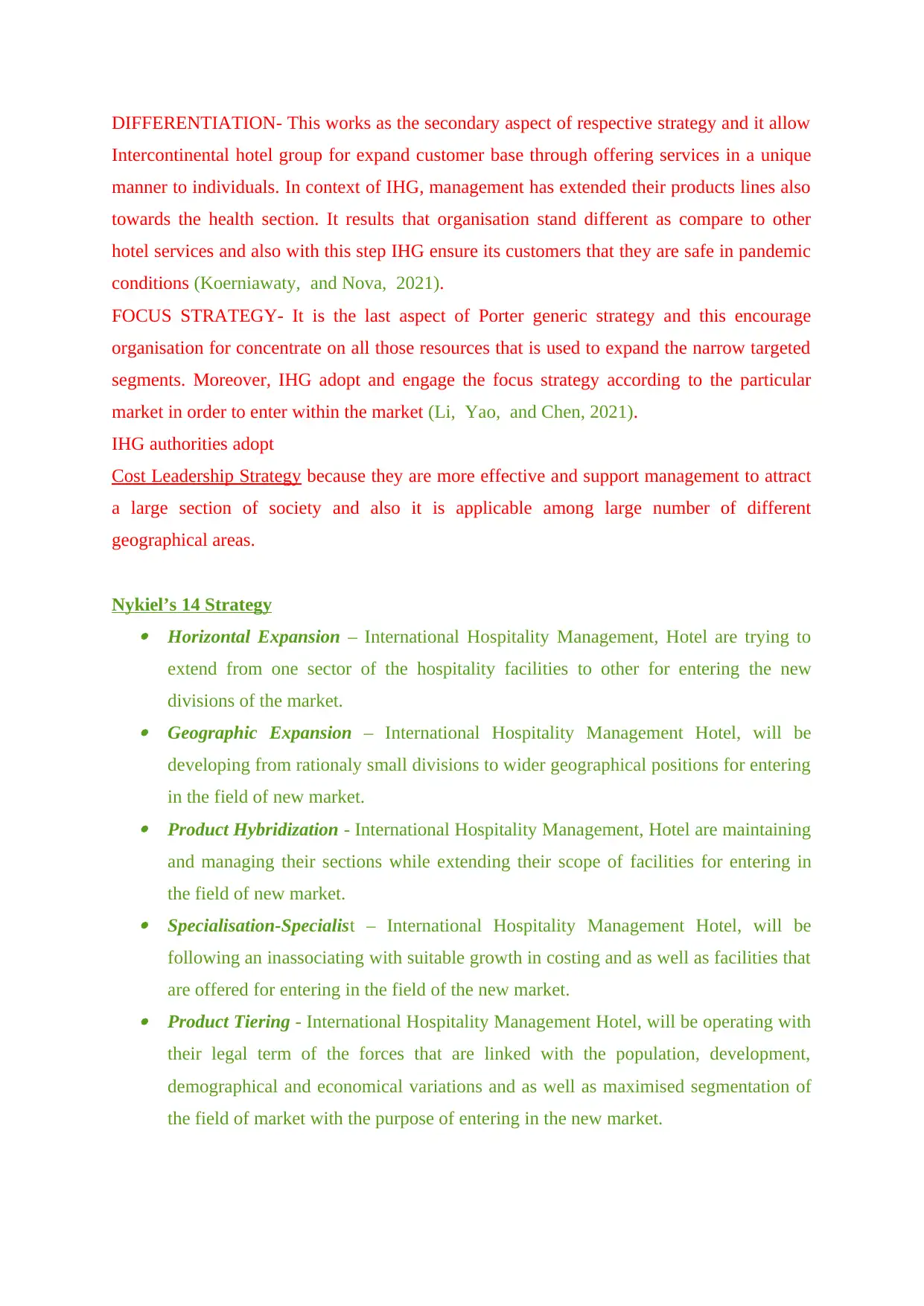
DIFFERENTIATION- This works as the secondary aspect of respective strategy and it allow
Intercontinental hotel group for expand customer base through offering services in a unique
manner to individuals. In context of IHG, management has extended their products lines also
towards the health section. It results that organisation stand different as compare to other
hotel services and also with this step IHG ensure its customers that they are safe in pandemic
conditions (Koerniawaty, and Nova, 2021).
FOCUS STRATEGY- It is the last aspect of Porter generic strategy and this encourage
organisation for concentrate on all those resources that is used to expand the narrow targeted
segments. Moreover, IHG adopt and engage the focus strategy according to the particular
market in order to enter within the market (Li, Yao, and Chen, 2021).
IHG authorities adopt
Cost Leadership Strategy because they are more effective and support management to attract
a large section of society and also it is applicable among large number of different
geographical areas.
Nykiel’s 14 Strategy Horizontal Expansion – International Hospitality Management, Hotel are trying to
extend from one sector of the hospitality facilities to other for entering the new
divisions of the market. Geographic Expansion – International Hospitality Management Hotel, will be
developing from rationaly small divisions to wider geographical positions for entering
in the field of new market. Product Hybridization - International Hospitality Management, Hotel are maintaining
and managing their sections while extending their scope of facilities for entering in
the field of new market. Specialisation-Specialist – International Hospitality Management Hotel, will be
following an inassociating with suitable growth in costing and as well as facilities that
are offered for entering in the field of the new market. Product Tiering - International Hospitality Management Hotel, will be operating with
their legal term of the forces that are linked with the population, development,
demographical and economical variations and as well as maximised segmentation of
the field of market with the purpose of entering in the new market.
Intercontinental hotel group for expand customer base through offering services in a unique
manner to individuals. In context of IHG, management has extended their products lines also
towards the health section. It results that organisation stand different as compare to other
hotel services and also with this step IHG ensure its customers that they are safe in pandemic
conditions (Koerniawaty, and Nova, 2021).
FOCUS STRATEGY- It is the last aspect of Porter generic strategy and this encourage
organisation for concentrate on all those resources that is used to expand the narrow targeted
segments. Moreover, IHG adopt and engage the focus strategy according to the particular
market in order to enter within the market (Li, Yao, and Chen, 2021).
IHG authorities adopt
Cost Leadership Strategy because they are more effective and support management to attract
a large section of society and also it is applicable among large number of different
geographical areas.
Nykiel’s 14 Strategy Horizontal Expansion – International Hospitality Management, Hotel are trying to
extend from one sector of the hospitality facilities to other for entering the new
divisions of the market. Geographic Expansion – International Hospitality Management Hotel, will be
developing from rationaly small divisions to wider geographical positions for entering
in the field of new market. Product Hybridization - International Hospitality Management, Hotel are maintaining
and managing their sections while extending their scope of facilities for entering in
the field of new market. Specialisation-Specialist – International Hospitality Management Hotel, will be
following an inassociating with suitable growth in costing and as well as facilities that
are offered for entering in the field of the new market. Product Tiering - International Hospitality Management Hotel, will be operating with
their legal term of the forces that are linked with the population, development,
demographical and economical variations and as well as maximised segmentation of
the field of market with the purpose of entering in the new market.
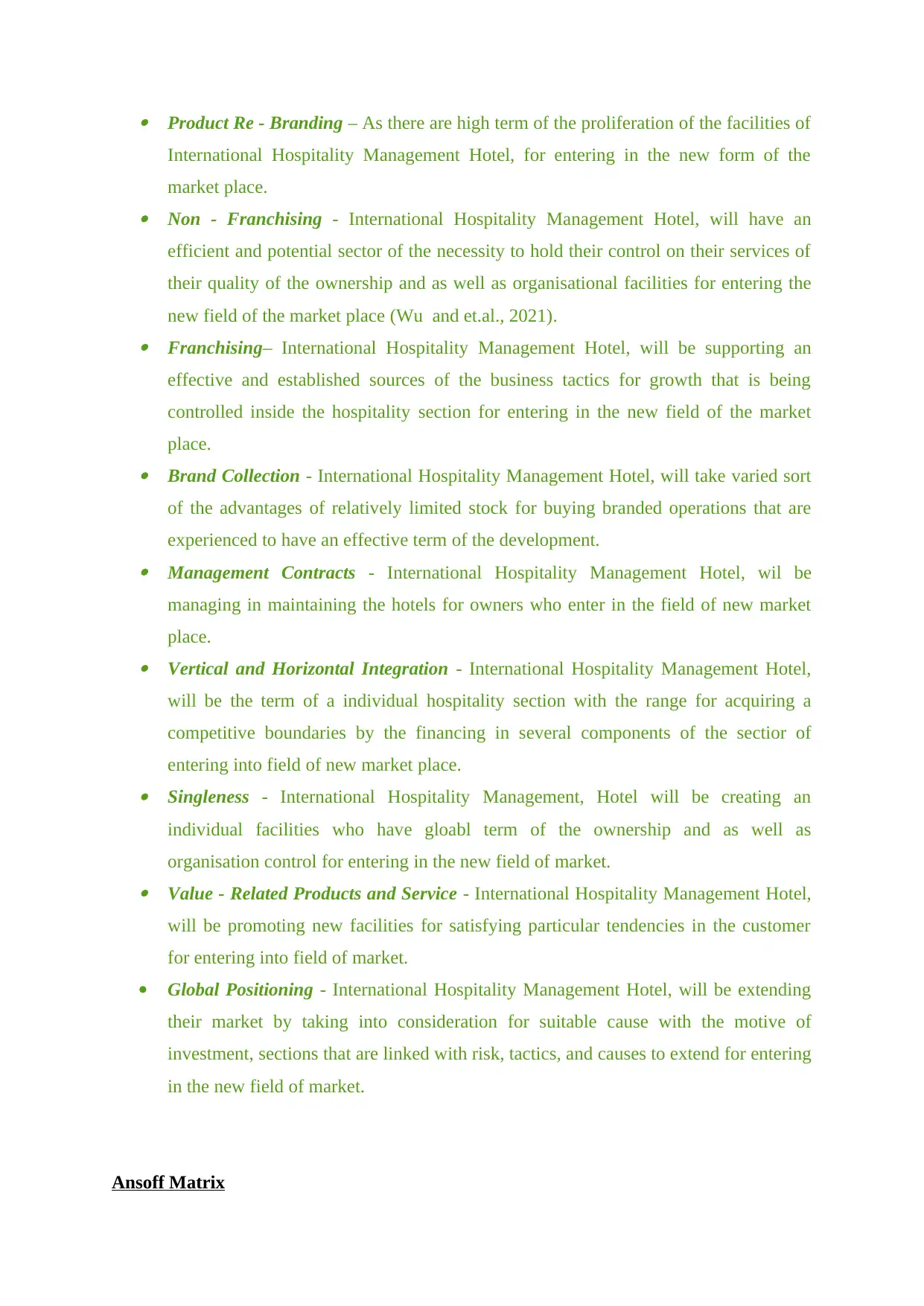
Product Re - Branding – As there are high term of the proliferation of the facilities of
International Hospitality Management Hotel, for entering in the new form of the
market place. Non - Franchising - International Hospitality Management Hotel, will have an
efficient and potential sector of the necessity to hold their control on their services of
their quality of the ownership and as well as organisational facilities for entering the
new field of the market place (Wu and et.al., 2021). Franchising– International Hospitality Management Hotel, will be supporting an
effective and established sources of the business tactics for growth that is being
controlled inside the hospitality section for entering in the new field of the market
place. Brand Collection - International Hospitality Management Hotel, will take varied sort
of the advantages of relatively limited stock for buying branded operations that are
experienced to have an effective term of the development. Management Contracts - International Hospitality Management Hotel, wil be
managing in maintaining the hotels for owners who enter in the field of new market
place. Vertical and Horizontal Integration - International Hospitality Management Hotel,
will be the term of a individual hospitality section with the range for acquiring a
competitive boundaries by the financing in several components of the sectior of
entering into field of new market place. Singleness - International Hospitality Management, Hotel will be creating an
individual facilities who have gloabl term of the ownership and as well as
organisation control for entering in the new field of market. Value - Related Products and Service - International Hospitality Management Hotel,
will be promoting new facilities for satisfying particular tendencies in the customer
for entering into field of market.
Global Positioning - International Hospitality Management Hotel, will be extending
their market by taking into consideration for suitable cause with the motive of
investment, sections that are linked with risk, tactics, and causes to extend for entering
in the new field of market.
Ansoff Matrix
International Hospitality Management Hotel, for entering in the new form of the
market place. Non - Franchising - International Hospitality Management Hotel, will have an
efficient and potential sector of the necessity to hold their control on their services of
their quality of the ownership and as well as organisational facilities for entering the
new field of the market place (Wu and et.al., 2021). Franchising– International Hospitality Management Hotel, will be supporting an
effective and established sources of the business tactics for growth that is being
controlled inside the hospitality section for entering in the new field of the market
place. Brand Collection - International Hospitality Management Hotel, will take varied sort
of the advantages of relatively limited stock for buying branded operations that are
experienced to have an effective term of the development. Management Contracts - International Hospitality Management Hotel, wil be
managing in maintaining the hotels for owners who enter in the field of new market
place. Vertical and Horizontal Integration - International Hospitality Management Hotel,
will be the term of a individual hospitality section with the range for acquiring a
competitive boundaries by the financing in several components of the sectior of
entering into field of new market place. Singleness - International Hospitality Management, Hotel will be creating an
individual facilities who have gloabl term of the ownership and as well as
organisation control for entering in the new field of market. Value - Related Products and Service - International Hospitality Management Hotel,
will be promoting new facilities for satisfying particular tendencies in the customer
for entering into field of market.
Global Positioning - International Hospitality Management Hotel, will be extending
their market by taking into consideration for suitable cause with the motive of
investment, sections that are linked with risk, tactics, and causes to extend for entering
in the new field of market.
Ansoff Matrix
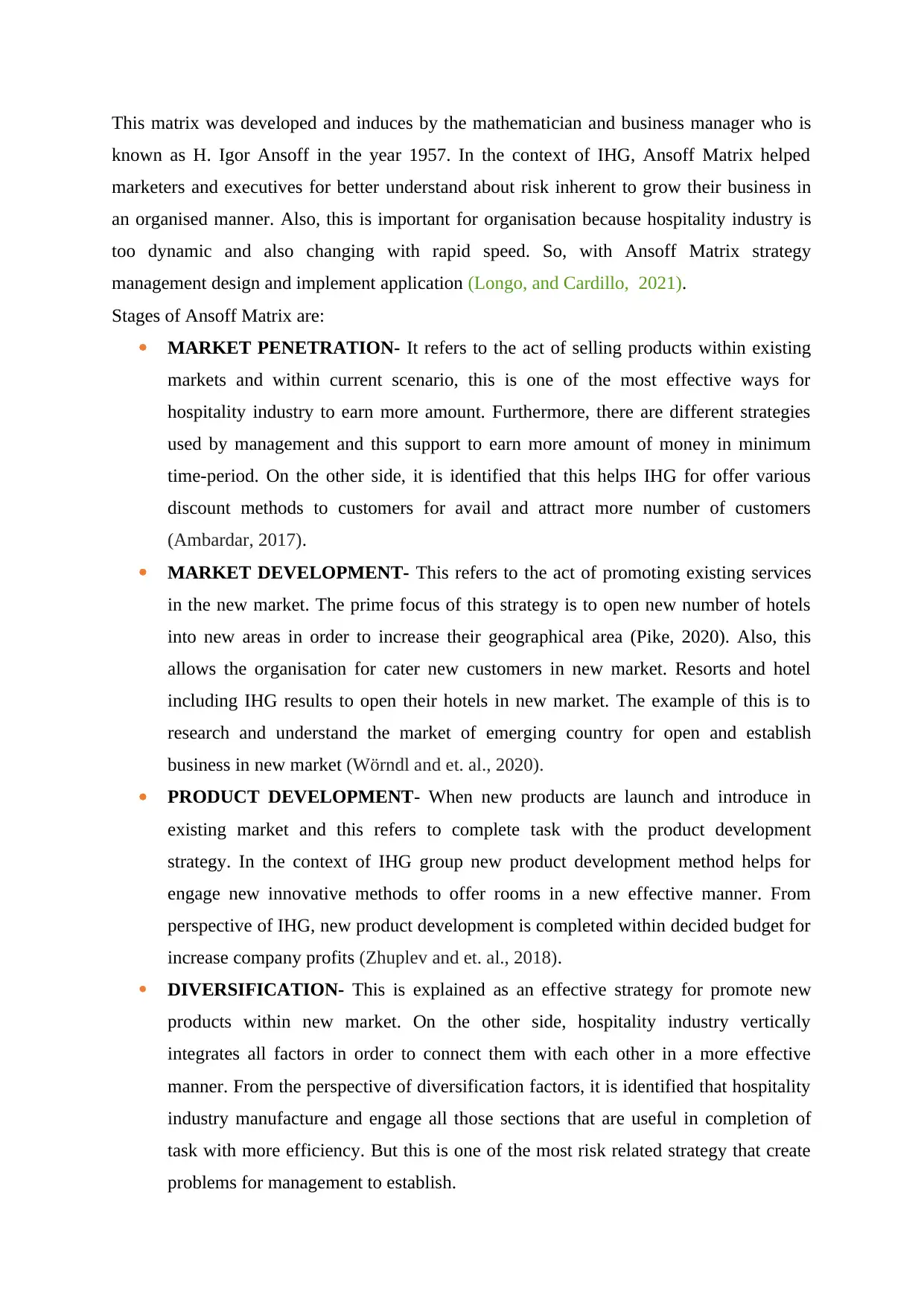
This matrix was developed and induces by the mathematician and business manager who is
known as H. Igor Ansoff in the year 1957. In the context of IHG, Ansoff Matrix helped
marketers and executives for better understand about risk inherent to grow their business in
an organised manner. Also, this is important for organisation because hospitality industry is
too dynamic and also changing with rapid speed. So, with Ansoff Matrix strategy
management design and implement application (Longo, and Cardillo, 2021).
Stages of Ansoff Matrix are:
MARKET PENETRATION- It refers to the act of selling products within existing
markets and within current scenario, this is one of the most effective ways for
hospitality industry to earn more amount. Furthermore, there are different strategies
used by management and this support to earn more amount of money in minimum
time-period. On the other side, it is identified that this helps IHG for offer various
discount methods to customers for avail and attract more number of customers
(Ambardar, 2017).
MARKET DEVELOPMENT- This refers to the act of promoting existing services
in the new market. The prime focus of this strategy is to open new number of hotels
into new areas in order to increase their geographical area (Pike, 2020). Also, this
allows the organisation for cater new customers in new market. Resorts and hotel
including IHG results to open their hotels in new market. The example of this is to
research and understand the market of emerging country for open and establish
business in new market (Wörndl and et. al., 2020).
PRODUCT DEVELOPMENT- When new products are launch and introduce in
existing market and this refers to complete task with the product development
strategy. In the context of IHG group new product development method helps for
engage new innovative methods to offer rooms in a new effective manner. From
perspective of IHG, new product development is completed within decided budget for
increase company profits (Zhuplev and et. al., 2018).
DIVERSIFICATION- This is explained as an effective strategy for promote new
products within new market. On the other side, hospitality industry vertically
integrates all factors in order to connect them with each other in a more effective
manner. From the perspective of diversification factors, it is identified that hospitality
industry manufacture and engage all those sections that are useful in completion of
task with more efficiency. But this is one of the most risk related strategy that create
problems for management to establish.
known as H. Igor Ansoff in the year 1957. In the context of IHG, Ansoff Matrix helped
marketers and executives for better understand about risk inherent to grow their business in
an organised manner. Also, this is important for organisation because hospitality industry is
too dynamic and also changing with rapid speed. So, with Ansoff Matrix strategy
management design and implement application (Longo, and Cardillo, 2021).
Stages of Ansoff Matrix are:
MARKET PENETRATION- It refers to the act of selling products within existing
markets and within current scenario, this is one of the most effective ways for
hospitality industry to earn more amount. Furthermore, there are different strategies
used by management and this support to earn more amount of money in minimum
time-period. On the other side, it is identified that this helps IHG for offer various
discount methods to customers for avail and attract more number of customers
(Ambardar, 2017).
MARKET DEVELOPMENT- This refers to the act of promoting existing services
in the new market. The prime focus of this strategy is to open new number of hotels
into new areas in order to increase their geographical area (Pike, 2020). Also, this
allows the organisation for cater new customers in new market. Resorts and hotel
including IHG results to open their hotels in new market. The example of this is to
research and understand the market of emerging country for open and establish
business in new market (Wörndl and et. al., 2020).
PRODUCT DEVELOPMENT- When new products are launch and introduce in
existing market and this refers to complete task with the product development
strategy. In the context of IHG group new product development method helps for
engage new innovative methods to offer rooms in a new effective manner. From
perspective of IHG, new product development is completed within decided budget for
increase company profits (Zhuplev and et. al., 2018).
DIVERSIFICATION- This is explained as an effective strategy for promote new
products within new market. On the other side, hospitality industry vertically
integrates all factors in order to connect them with each other in a more effective
manner. From the perspective of diversification factors, it is identified that hospitality
industry manufacture and engage all those sections that are useful in completion of
task with more efficiency. But this is one of the most risk related strategy that create
problems for management to establish.
Paraphrase This Document
Need a fresh take? Get an instant paraphrase of this document with our AI Paraphraser
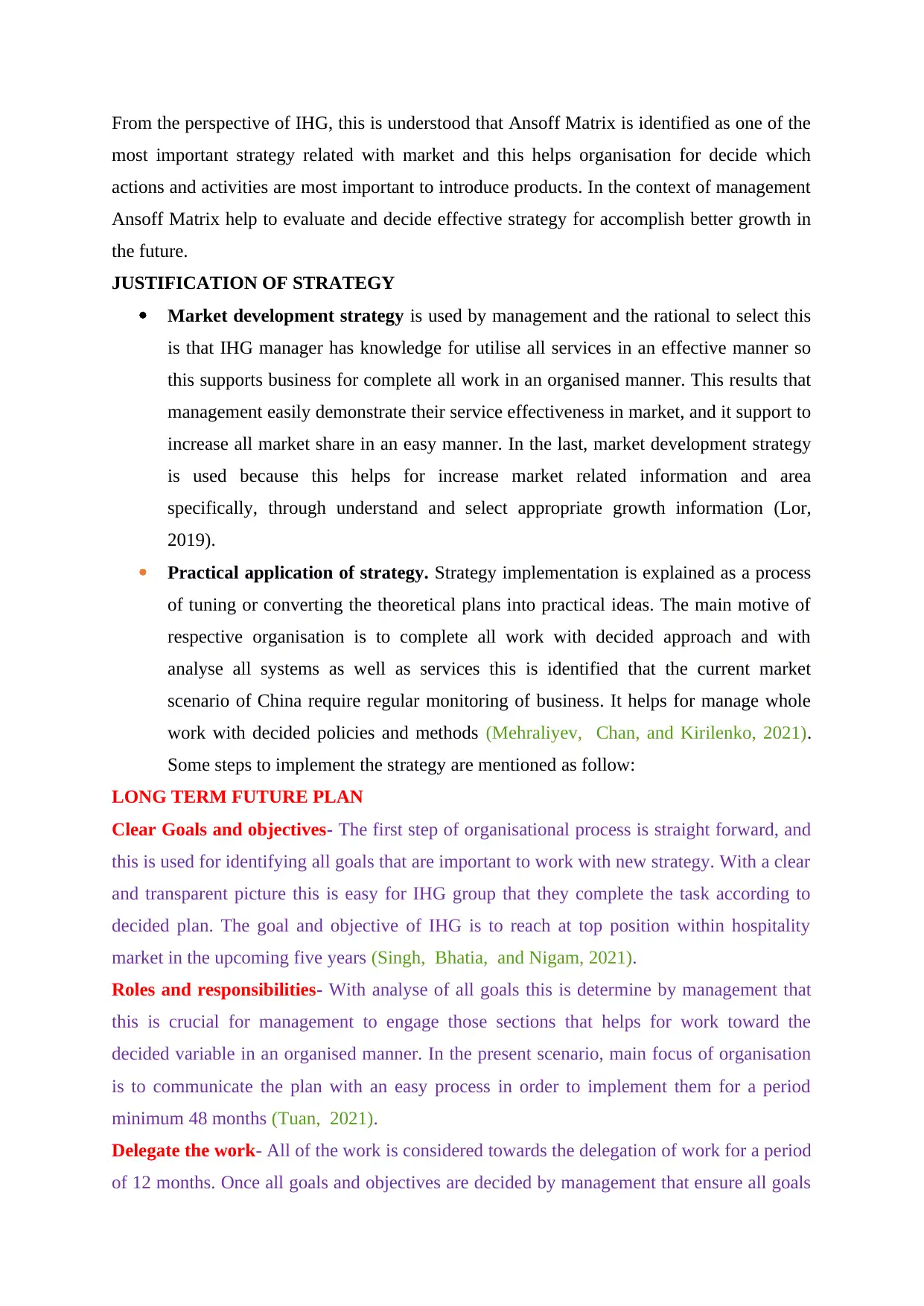
From the perspective of IHG, this is understood that Ansoff Matrix is identified as one of the
most important strategy related with market and this helps organisation for decide which
actions and activities are most important to introduce products. In the context of management
Ansoff Matrix help to evaluate and decide effective strategy for accomplish better growth in
the future.
JUSTIFICATION OF STRATEGY
Market development strategy is used by management and the rational to select this
is that IHG manager has knowledge for utilise all services in an effective manner so
this supports business for complete all work in an organised manner. This results that
management easily demonstrate their service effectiveness in market, and it support to
increase all market share in an easy manner. In the last, market development strategy
is used because this helps for increase market related information and area
specifically, through understand and select appropriate growth information (Lor,
2019).
Practical application of strategy. Strategy implementation is explained as a process
of tuning or converting the theoretical plans into practical ideas. The main motive of
respective organisation is to complete all work with decided approach and with
analyse all systems as well as services this is identified that the current market
scenario of China require regular monitoring of business. It helps for manage whole
work with decided policies and methods (Mehraliyev, Chan, and Kirilenko, 2021).
Some steps to implement the strategy are mentioned as follow:
LONG TERM FUTURE PLAN
Clear Goals and objectives- The first step of organisational process is straight forward, and
this is used for identifying all goals that are important to work with new strategy. With a clear
and transparent picture this is easy for IHG group that they complete the task according to
decided plan. The goal and objective of IHG is to reach at top position within hospitality
market in the upcoming five years (Singh, Bhatia, and Nigam, 2021).
Roles and responsibilities- With analyse of all goals this is determine by management that
this is crucial for management to engage those sections that helps for work toward the
decided variable in an organised manner. In the present scenario, main focus of organisation
is to communicate the plan with an easy process in order to implement them for a period
minimum 48 months (Tuan, 2021).
Delegate the work- All of the work is considered towards the delegation of work for a period
of 12 months. Once all goals and objectives are decided by management that ensure all goals
most important strategy related with market and this helps organisation for decide which
actions and activities are most important to introduce products. In the context of management
Ansoff Matrix help to evaluate and decide effective strategy for accomplish better growth in
the future.
JUSTIFICATION OF STRATEGY
Market development strategy is used by management and the rational to select this
is that IHG manager has knowledge for utilise all services in an effective manner so
this supports business for complete all work in an organised manner. This results that
management easily demonstrate their service effectiveness in market, and it support to
increase all market share in an easy manner. In the last, market development strategy
is used because this helps for increase market related information and area
specifically, through understand and select appropriate growth information (Lor,
2019).
Practical application of strategy. Strategy implementation is explained as a process
of tuning or converting the theoretical plans into practical ideas. The main motive of
respective organisation is to complete all work with decided approach and with
analyse all systems as well as services this is identified that the current market
scenario of China require regular monitoring of business. It helps for manage whole
work with decided policies and methods (Mehraliyev, Chan, and Kirilenko, 2021).
Some steps to implement the strategy are mentioned as follow:
LONG TERM FUTURE PLAN
Clear Goals and objectives- The first step of organisational process is straight forward, and
this is used for identifying all goals that are important to work with new strategy. With a clear
and transparent picture this is easy for IHG group that they complete the task according to
decided plan. The goal and objective of IHG is to reach at top position within hospitality
market in the upcoming five years (Singh, Bhatia, and Nigam, 2021).
Roles and responsibilities- With analyse of all goals this is determine by management that
this is crucial for management to engage those sections that helps for work toward the
decided variable in an organised manner. In the present scenario, main focus of organisation
is to communicate the plan with an easy process in order to implement them for a period
minimum 48 months (Tuan, 2021).
Delegate the work- All of the work is considered towards the delegation of work for a period
of 12 months. Once all goals and objectives are decided by management that ensure all goals
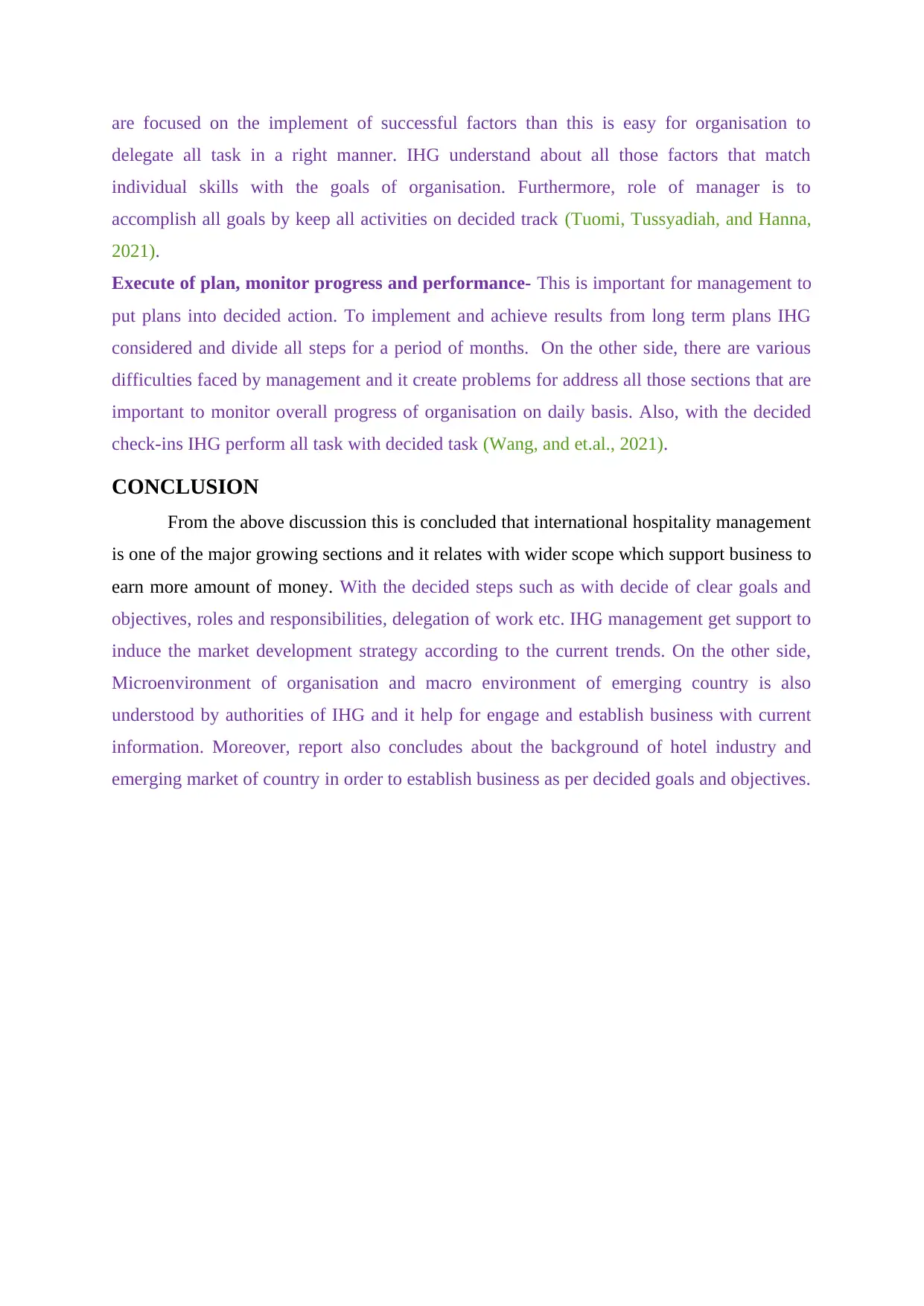
are focused on the implement of successful factors than this is easy for organisation to
delegate all task in a right manner. IHG understand about all those factors that match
individual skills with the goals of organisation. Furthermore, role of manager is to
accomplish all goals by keep all activities on decided track (Tuomi, Tussyadiah, and Hanna,
2021).
Execute of plan, monitor progress and performance- This is important for management to
put plans into decided action. To implement and achieve results from long term plans IHG
considered and divide all steps for a period of months. On the other side, there are various
difficulties faced by management and it create problems for address all those sections that are
important to monitor overall progress of organisation on daily basis. Also, with the decided
check-ins IHG perform all task with decided task (Wang, and et.al., 2021).
CONCLUSION
From the above discussion this is concluded that international hospitality management
is one of the major growing sections and it relates with wider scope which support business to
earn more amount of money. With the decided steps such as with decide of clear goals and
objectives, roles and responsibilities, delegation of work etc. IHG management get support to
induce the market development strategy according to the current trends. On the other side,
Microenvironment of organisation and macro environment of emerging country is also
understood by authorities of IHG and it help for engage and establish business with current
information. Moreover, report also concludes about the background of hotel industry and
emerging market of country in order to establish business as per decided goals and objectives.
delegate all task in a right manner. IHG understand about all those factors that match
individual skills with the goals of organisation. Furthermore, role of manager is to
accomplish all goals by keep all activities on decided track (Tuomi, Tussyadiah, and Hanna,
2021).
Execute of plan, monitor progress and performance- This is important for management to
put plans into decided action. To implement and achieve results from long term plans IHG
considered and divide all steps for a period of months. On the other side, there are various
difficulties faced by management and it create problems for address all those sections that are
important to monitor overall progress of organisation on daily basis. Also, with the decided
check-ins IHG perform all task with decided task (Wang, and et.al., 2021).
CONCLUSION
From the above discussion this is concluded that international hospitality management
is one of the major growing sections and it relates with wider scope which support business to
earn more amount of money. With the decided steps such as with decide of clear goals and
objectives, roles and responsibilities, delegation of work etc. IHG management get support to
induce the market development strategy according to the current trends. On the other side,
Microenvironment of organisation and macro environment of emerging country is also
understood by authorities of IHG and it help for engage and establish business with current
information. Moreover, report also concludes about the background of hotel industry and
emerging market of country in order to establish business as per decided goals and objectives.
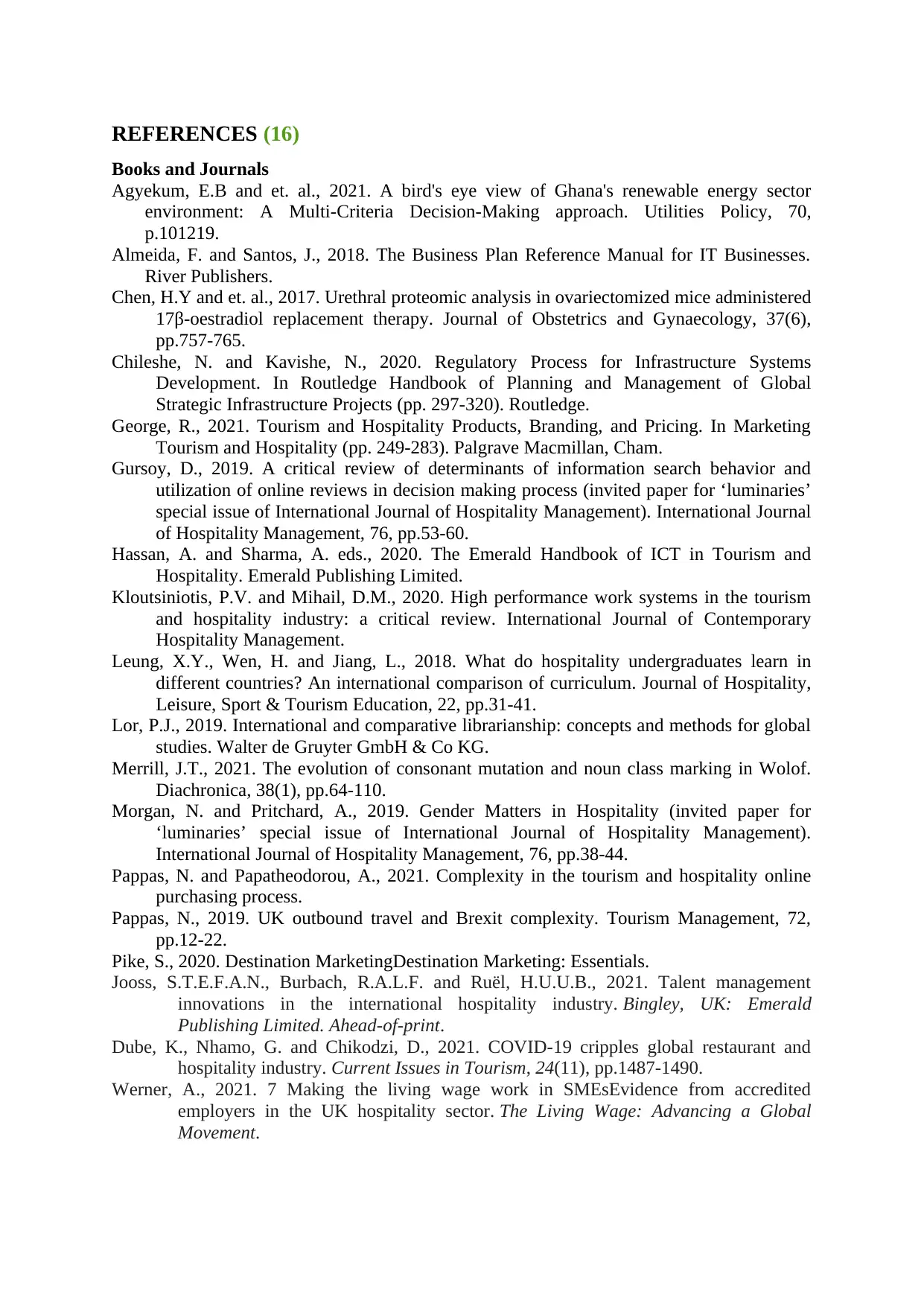
REFERENCES (16)
Books and Journals
Agyekum, E.B and et. al., 2021. A bird's eye view of Ghana's renewable energy sector
environment: A Multi-Criteria Decision-Making approach. Utilities Policy, 70,
p.101219.
Almeida, F. and Santos, J., 2018. The Business Plan Reference Manual for IT Businesses.
River Publishers.
Chen, H.Y and et. al., 2017. Urethral proteomic analysis in ovariectomized mice administered
17β-oestradiol replacement therapy. Journal of Obstetrics and Gynaecology, 37(6),
pp.757-765.
Chileshe, N. and Kavishe, N., 2020. Regulatory Process for Infrastructure Systems
Development. In Routledge Handbook of Planning and Management of Global
Strategic Infrastructure Projects (pp. 297-320). Routledge.
George, R., 2021. Tourism and Hospitality Products, Branding, and Pricing. In Marketing
Tourism and Hospitality (pp. 249-283). Palgrave Macmillan, Cham.
Gursoy, D., 2019. A critical review of determinants of information search behavior and
utilization of online reviews in decision making process (invited paper for ‘luminaries’
special issue of International Journal of Hospitality Management). International Journal
of Hospitality Management, 76, pp.53-60.
Hassan, A. and Sharma, A. eds., 2020. The Emerald Handbook of ICT in Tourism and
Hospitality. Emerald Publishing Limited.
Kloutsiniotis, P.V. and Mihail, D.M., 2020. High performance work systems in the tourism
and hospitality industry: a critical review. International Journal of Contemporary
Hospitality Management.
Leung, X.Y., Wen, H. and Jiang, L., 2018. What do hospitality undergraduates learn in
different countries? An international comparison of curriculum. Journal of Hospitality,
Leisure, Sport & Tourism Education, 22, pp.31-41.
Lor, P.J., 2019. International and comparative librarianship: concepts and methods for global
studies. Walter de Gruyter GmbH & Co KG.
Merrill, J.T., 2021. The evolution of consonant mutation and noun class marking in Wolof.
Diachronica, 38(1), pp.64-110.
Morgan, N. and Pritchard, A., 2019. Gender Matters in Hospitality (invited paper for
‘luminaries’ special issue of International Journal of Hospitality Management).
International Journal of Hospitality Management, 76, pp.38-44.
Pappas, N. and Papatheodorou, A., 2021. Complexity in the tourism and hospitality online
purchasing process.
Pappas, N., 2019. UK outbound travel and Brexit complexity. Tourism Management, 72,
pp.12-22.
Pike, S., 2020. Destination MarketingDestination Marketing: Essentials.
Jooss, S.T.E.F.A.N., Burbach, R.A.L.F. and Ruël, H.U.U.B., 2021. Talent management
innovations in the international hospitality industry. Bingley, UK: Emerald
Publishing Limited. Ahead-of-print.
Dube, K., Nhamo, G. and Chikodzi, D., 2021. COVID-19 cripples global restaurant and
hospitality industry. Current Issues in Tourism, 24(11), pp.1487-1490.
Werner, A., 2021. 7 Making the living wage work in SMEsEvidence from accredited
employers in the UK hospitality sector. The Living Wage: Advancing a Global
Movement.
Books and Journals
Agyekum, E.B and et. al., 2021. A bird's eye view of Ghana's renewable energy sector
environment: A Multi-Criteria Decision-Making approach. Utilities Policy, 70,
p.101219.
Almeida, F. and Santos, J., 2018. The Business Plan Reference Manual for IT Businesses.
River Publishers.
Chen, H.Y and et. al., 2017. Urethral proteomic analysis in ovariectomized mice administered
17β-oestradiol replacement therapy. Journal of Obstetrics and Gynaecology, 37(6),
pp.757-765.
Chileshe, N. and Kavishe, N., 2020. Regulatory Process for Infrastructure Systems
Development. In Routledge Handbook of Planning and Management of Global
Strategic Infrastructure Projects (pp. 297-320). Routledge.
George, R., 2021. Tourism and Hospitality Products, Branding, and Pricing. In Marketing
Tourism and Hospitality (pp. 249-283). Palgrave Macmillan, Cham.
Gursoy, D., 2019. A critical review of determinants of information search behavior and
utilization of online reviews in decision making process (invited paper for ‘luminaries’
special issue of International Journal of Hospitality Management). International Journal
of Hospitality Management, 76, pp.53-60.
Hassan, A. and Sharma, A. eds., 2020. The Emerald Handbook of ICT in Tourism and
Hospitality. Emerald Publishing Limited.
Kloutsiniotis, P.V. and Mihail, D.M., 2020. High performance work systems in the tourism
and hospitality industry: a critical review. International Journal of Contemporary
Hospitality Management.
Leung, X.Y., Wen, H. and Jiang, L., 2018. What do hospitality undergraduates learn in
different countries? An international comparison of curriculum. Journal of Hospitality,
Leisure, Sport & Tourism Education, 22, pp.31-41.
Lor, P.J., 2019. International and comparative librarianship: concepts and methods for global
studies. Walter de Gruyter GmbH & Co KG.
Merrill, J.T., 2021. The evolution of consonant mutation and noun class marking in Wolof.
Diachronica, 38(1), pp.64-110.
Morgan, N. and Pritchard, A., 2019. Gender Matters in Hospitality (invited paper for
‘luminaries’ special issue of International Journal of Hospitality Management).
International Journal of Hospitality Management, 76, pp.38-44.
Pappas, N. and Papatheodorou, A., 2021. Complexity in the tourism and hospitality online
purchasing process.
Pappas, N., 2019. UK outbound travel and Brexit complexity. Tourism Management, 72,
pp.12-22.
Pike, S., 2020. Destination MarketingDestination Marketing: Essentials.
Jooss, S.T.E.F.A.N., Burbach, R.A.L.F. and Ruël, H.U.U.B., 2021. Talent management
innovations in the international hospitality industry. Bingley, UK: Emerald
Publishing Limited. Ahead-of-print.
Dube, K., Nhamo, G. and Chikodzi, D., 2021. COVID-19 cripples global restaurant and
hospitality industry. Current Issues in Tourism, 24(11), pp.1487-1490.
Werner, A., 2021. 7 Making the living wage work in SMEsEvidence from accredited
employers in the UK hospitality sector. The Living Wage: Advancing a Global
Movement.
Secure Best Marks with AI Grader
Need help grading? Try our AI Grader for instant feedback on your assignments.
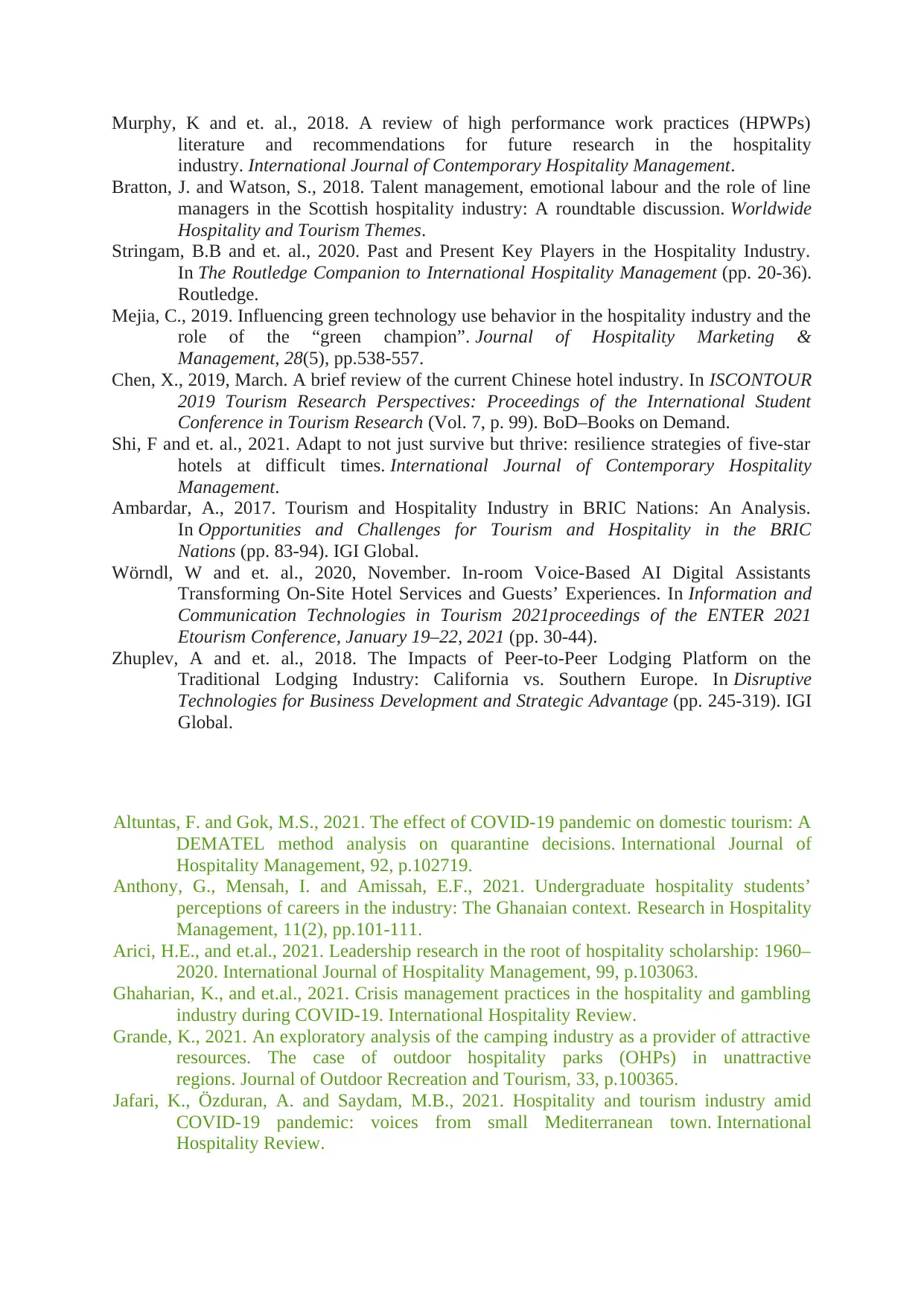
Murphy, K and et. al., 2018. A review of high performance work practices (HPWPs)
literature and recommendations for future research in the hospitality
industry. International Journal of Contemporary Hospitality Management.
Bratton, J. and Watson, S., 2018. Talent management, emotional labour and the role of line
managers in the Scottish hospitality industry: A roundtable discussion. Worldwide
Hospitality and Tourism Themes.
Stringam, B.B and et. al., 2020. Past and Present Key Players in the Hospitality Industry.
In The Routledge Companion to International Hospitality Management (pp. 20-36).
Routledge.
Mejia, C., 2019. Influencing green technology use behavior in the hospitality industry and the
role of the “green champion”. Journal of Hospitality Marketing &
Management, 28(5), pp.538-557.
Chen, X., 2019, March. A brief review of the current Chinese hotel industry. In ISCONTOUR
2019 Tourism Research Perspectives: Proceedings of the International Student
Conference in Tourism Research (Vol. 7, p. 99). BoD–Books on Demand.
Shi, F and et. al., 2021. Adapt to not just survive but thrive: resilience strategies of five-star
hotels at difficult times. International Journal of Contemporary Hospitality
Management.
Ambardar, A., 2017. Tourism and Hospitality Industry in BRIC Nations: An Analysis.
In Opportunities and Challenges for Tourism and Hospitality in the BRIC
Nations (pp. 83-94). IGI Global.
Wörndl, W and et. al., 2020, November. In-room Voice-Based AI Digital Assistants
Transforming On-Site Hotel Services and Guests’ Experiences. In Information and
Communication Technologies in Tourism 2021proceedings of the ENTER 2021
Etourism Conference, January 19–22, 2021 (pp. 30-44).
Zhuplev, A and et. al., 2018. The Impacts of Peer-to-Peer Lodging Platform on the
Traditional Lodging Industry: California vs. Southern Europe. In Disruptive
Technologies for Business Development and Strategic Advantage (pp. 245-319). IGI
Global.
Altuntas, F. and Gok, M.S., 2021. The effect of COVID-19 pandemic on domestic tourism: A
DEMATEL method analysis on quarantine decisions. International Journal of
Hospitality Management, 92, p.102719.
Anthony, G., Mensah, I. and Amissah, E.F., 2021. Undergraduate hospitality students’
perceptions of careers in the industry: The Ghanaian context. Research in Hospitality
Management, 11(2), pp.101-111.
Arici, H.E., and et.al., 2021. Leadership research in the root of hospitality scholarship: 1960–
2020. International Journal of Hospitality Management, 99, p.103063.
Ghaharian, K., and et.al., 2021. Crisis management practices in the hospitality and gambling
industry during COVID-19. International Hospitality Review.
Grande, K., 2021. An exploratory analysis of the camping industry as a provider of attractive
resources. The case of outdoor hospitality parks (OHPs) in unattractive
regions. Journal of Outdoor Recreation and Tourism, 33, p.100365.
Jafari, K., Özduran, A. and Saydam, M.B., 2021. Hospitality and tourism industry amid
COVID-19 pandemic: voices from small Mediterranean town. International
Hospitality Review.
literature and recommendations for future research in the hospitality
industry. International Journal of Contemporary Hospitality Management.
Bratton, J. and Watson, S., 2018. Talent management, emotional labour and the role of line
managers in the Scottish hospitality industry: A roundtable discussion. Worldwide
Hospitality and Tourism Themes.
Stringam, B.B and et. al., 2020. Past and Present Key Players in the Hospitality Industry.
In The Routledge Companion to International Hospitality Management (pp. 20-36).
Routledge.
Mejia, C., 2019. Influencing green technology use behavior in the hospitality industry and the
role of the “green champion”. Journal of Hospitality Marketing &
Management, 28(5), pp.538-557.
Chen, X., 2019, March. A brief review of the current Chinese hotel industry. In ISCONTOUR
2019 Tourism Research Perspectives: Proceedings of the International Student
Conference in Tourism Research (Vol. 7, p. 99). BoD–Books on Demand.
Shi, F and et. al., 2021. Adapt to not just survive but thrive: resilience strategies of five-star
hotels at difficult times. International Journal of Contemporary Hospitality
Management.
Ambardar, A., 2017. Tourism and Hospitality Industry in BRIC Nations: An Analysis.
In Opportunities and Challenges for Tourism and Hospitality in the BRIC
Nations (pp. 83-94). IGI Global.
Wörndl, W and et. al., 2020, November. In-room Voice-Based AI Digital Assistants
Transforming On-Site Hotel Services and Guests’ Experiences. In Information and
Communication Technologies in Tourism 2021proceedings of the ENTER 2021
Etourism Conference, January 19–22, 2021 (pp. 30-44).
Zhuplev, A and et. al., 2018. The Impacts of Peer-to-Peer Lodging Platform on the
Traditional Lodging Industry: California vs. Southern Europe. In Disruptive
Technologies for Business Development and Strategic Advantage (pp. 245-319). IGI
Global.
Altuntas, F. and Gok, M.S., 2021. The effect of COVID-19 pandemic on domestic tourism: A
DEMATEL method analysis on quarantine decisions. International Journal of
Hospitality Management, 92, p.102719.
Anthony, G., Mensah, I. and Amissah, E.F., 2021. Undergraduate hospitality students’
perceptions of careers in the industry: The Ghanaian context. Research in Hospitality
Management, 11(2), pp.101-111.
Arici, H.E., and et.al., 2021. Leadership research in the root of hospitality scholarship: 1960–
2020. International Journal of Hospitality Management, 99, p.103063.
Ghaharian, K., and et.al., 2021. Crisis management practices in the hospitality and gambling
industry during COVID-19. International Hospitality Review.
Grande, K., 2021. An exploratory analysis of the camping industry as a provider of attractive
resources. The case of outdoor hospitality parks (OHPs) in unattractive
regions. Journal of Outdoor Recreation and Tourism, 33, p.100365.
Jafari, K., Özduran, A. and Saydam, M.B., 2021. Hospitality and tourism industry amid
COVID-19 pandemic: voices from small Mediterranean town. International
Hospitality Review.
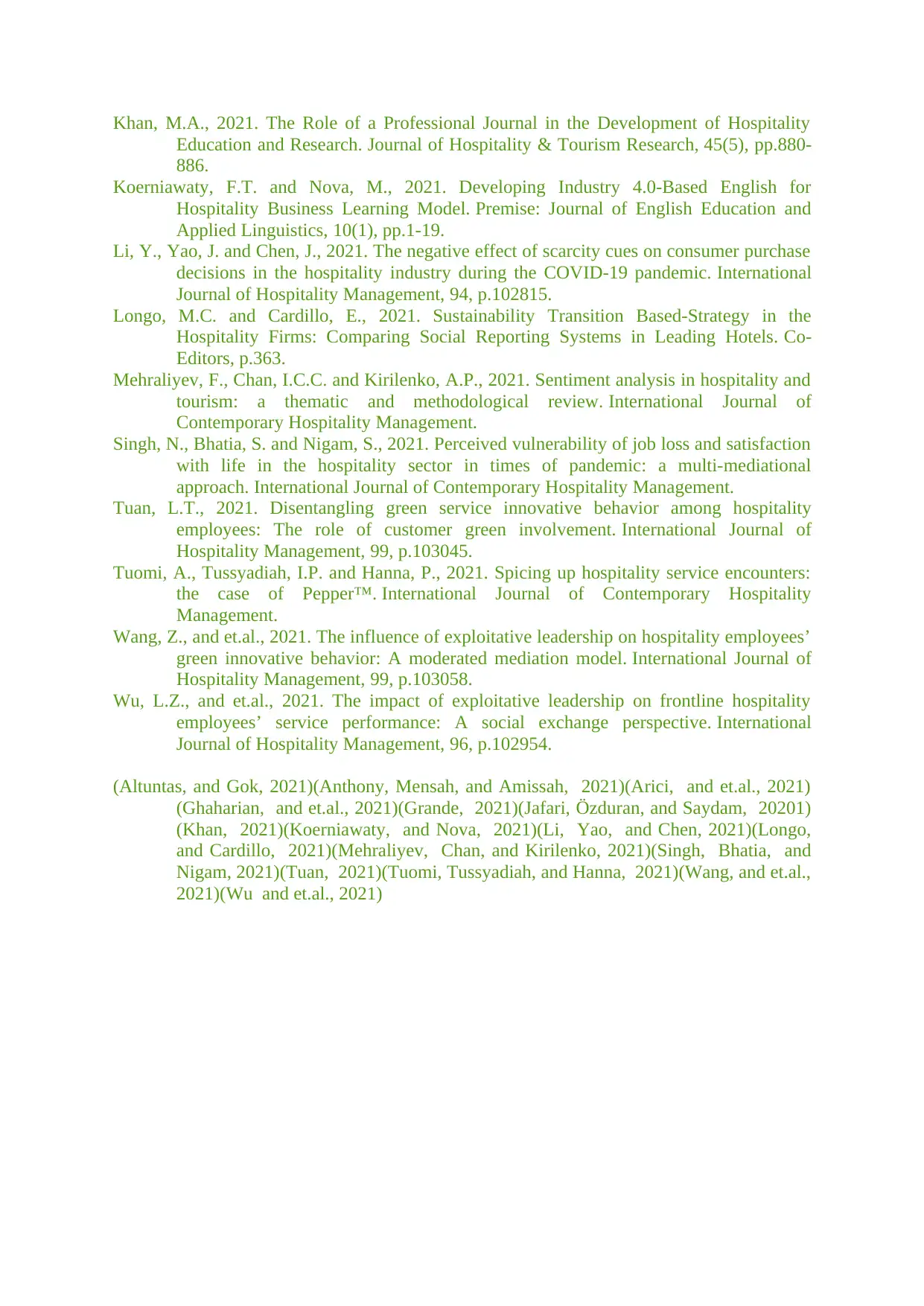
Khan, M.A., 2021. The Role of a Professional Journal in the Development of Hospitality
Education and Research. Journal of Hospitality & Tourism Research, 45(5), pp.880-
886.
Koerniawaty, F.T. and Nova, M., 2021. Developing Industry 4.0-Based English for
Hospitality Business Learning Model. Premise: Journal of English Education and
Applied Linguistics, 10(1), pp.1-19.
Li, Y., Yao, J. and Chen, J., 2021. The negative effect of scarcity cues on consumer purchase
decisions in the hospitality industry during the COVID-19 pandemic. International
Journal of Hospitality Management, 94, p.102815.
Longo, M.C. and Cardillo, E., 2021. Sustainability Transition Based-Strategy in the
Hospitality Firms: Comparing Social Reporting Systems in Leading Hotels. Co-
Editors, p.363.
Mehraliyev, F., Chan, I.C.C. and Kirilenko, A.P., 2021. Sentiment analysis in hospitality and
tourism: a thematic and methodological review. International Journal of
Contemporary Hospitality Management.
Singh, N., Bhatia, S. and Nigam, S., 2021. Perceived vulnerability of job loss and satisfaction
with life in the hospitality sector in times of pandemic: a multi-mediational
approach. International Journal of Contemporary Hospitality Management.
Tuan, L.T., 2021. Disentangling green service innovative behavior among hospitality
employees: The role of customer green involvement. International Journal of
Hospitality Management, 99, p.103045.
Tuomi, A., Tussyadiah, I.P. and Hanna, P., 2021. Spicing up hospitality service encounters:
the case of Pepper™. International Journal of Contemporary Hospitality
Management.
Wang, Z., and et.al., 2021. The influence of exploitative leadership on hospitality employees’
green innovative behavior: A moderated mediation model. International Journal of
Hospitality Management, 99, p.103058.
Wu, L.Z., and et.al., 2021. The impact of exploitative leadership on frontline hospitality
employees’ service performance: A social exchange perspective. International
Journal of Hospitality Management, 96, p.102954.
(Altuntas, and Gok, 2021)(Anthony, Mensah, and Amissah, 2021)(Arici, and et.al., 2021)
(Ghaharian, and et.al., 2021)(Grande, 2021)(Jafari, Özduran, and Saydam, 20201)
(Khan, 2021)(Koerniawaty, and Nova, 2021)(Li, Yao, and Chen, 2021)(Longo,
and Cardillo, 2021)(Mehraliyev, Chan, and Kirilenko, 2021)(Singh, Bhatia, and
Nigam, 2021)(Tuan, 2021)(Tuomi, Tussyadiah, and Hanna, 2021)(Wang, and et.al.,
2021)(Wu and et.al., 2021)
Education and Research. Journal of Hospitality & Tourism Research, 45(5), pp.880-
886.
Koerniawaty, F.T. and Nova, M., 2021. Developing Industry 4.0-Based English for
Hospitality Business Learning Model. Premise: Journal of English Education and
Applied Linguistics, 10(1), pp.1-19.
Li, Y., Yao, J. and Chen, J., 2021. The negative effect of scarcity cues on consumer purchase
decisions in the hospitality industry during the COVID-19 pandemic. International
Journal of Hospitality Management, 94, p.102815.
Longo, M.C. and Cardillo, E., 2021. Sustainability Transition Based-Strategy in the
Hospitality Firms: Comparing Social Reporting Systems in Leading Hotels. Co-
Editors, p.363.
Mehraliyev, F., Chan, I.C.C. and Kirilenko, A.P., 2021. Sentiment analysis in hospitality and
tourism: a thematic and methodological review. International Journal of
Contemporary Hospitality Management.
Singh, N., Bhatia, S. and Nigam, S., 2021. Perceived vulnerability of job loss and satisfaction
with life in the hospitality sector in times of pandemic: a multi-mediational
approach. International Journal of Contemporary Hospitality Management.
Tuan, L.T., 2021. Disentangling green service innovative behavior among hospitality
employees: The role of customer green involvement. International Journal of
Hospitality Management, 99, p.103045.
Tuomi, A., Tussyadiah, I.P. and Hanna, P., 2021. Spicing up hospitality service encounters:
the case of Pepper™. International Journal of Contemporary Hospitality
Management.
Wang, Z., and et.al., 2021. The influence of exploitative leadership on hospitality employees’
green innovative behavior: A moderated mediation model. International Journal of
Hospitality Management, 99, p.103058.
Wu, L.Z., and et.al., 2021. The impact of exploitative leadership on frontline hospitality
employees’ service performance: A social exchange perspective. International
Journal of Hospitality Management, 96, p.102954.
(Altuntas, and Gok, 2021)(Anthony, Mensah, and Amissah, 2021)(Arici, and et.al., 2021)
(Ghaharian, and et.al., 2021)(Grande, 2021)(Jafari, Özduran, and Saydam, 20201)
(Khan, 2021)(Koerniawaty, and Nova, 2021)(Li, Yao, and Chen, 2021)(Longo,
and Cardillo, 2021)(Mehraliyev, Chan, and Kirilenko, 2021)(Singh, Bhatia, and
Nigam, 2021)(Tuan, 2021)(Tuomi, Tussyadiah, and Hanna, 2021)(Wang, and et.al.,
2021)(Wu and et.al., 2021)
1 out of 18
Related Documents
Your All-in-One AI-Powered Toolkit for Academic Success.
+13062052269
info@desklib.com
Available 24*7 on WhatsApp / Email
![[object Object]](/_next/static/media/star-bottom.7253800d.svg)
Unlock your academic potential
© 2024 | Zucol Services PVT LTD | All rights reserved.





